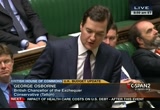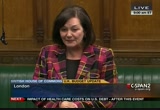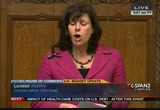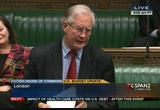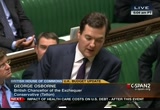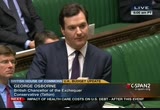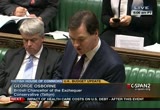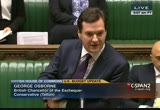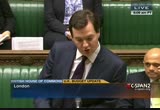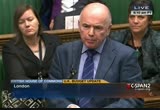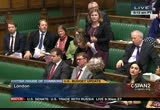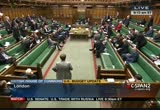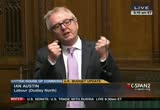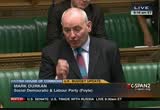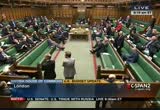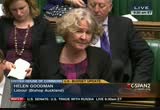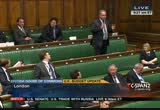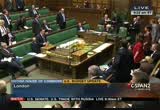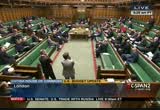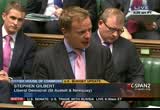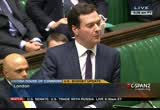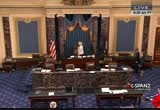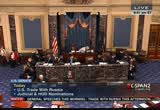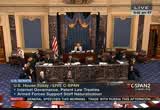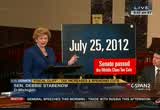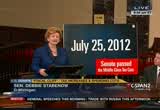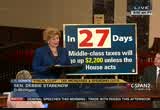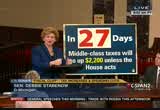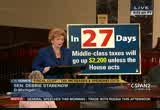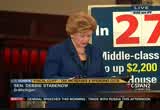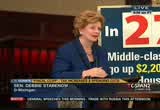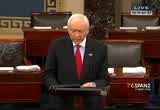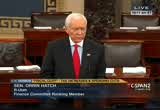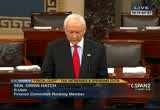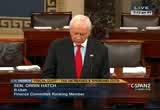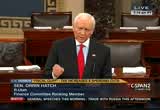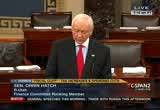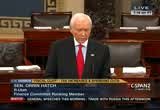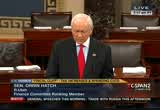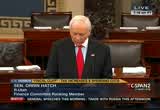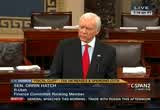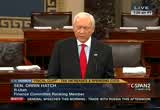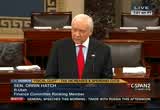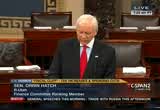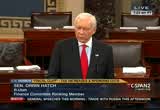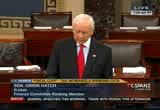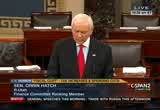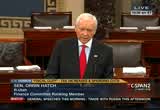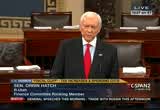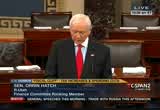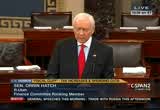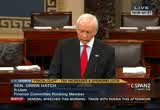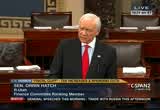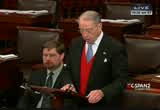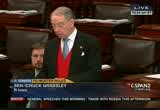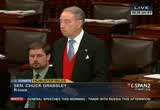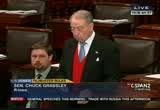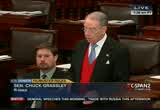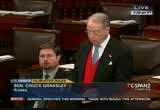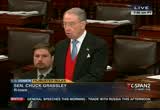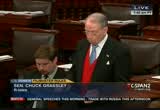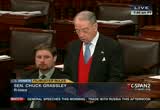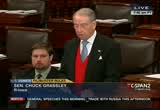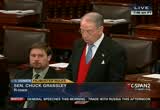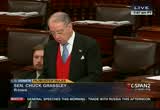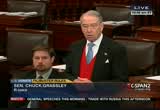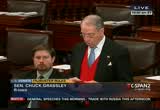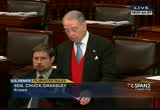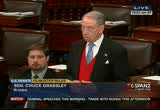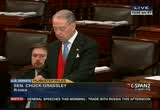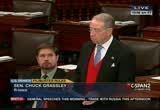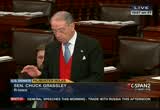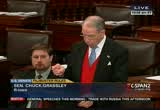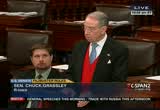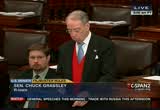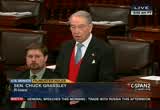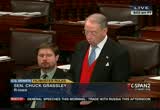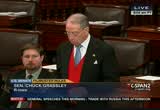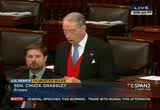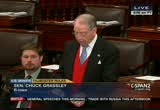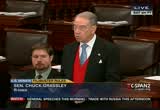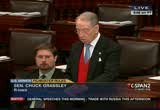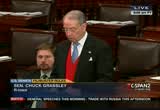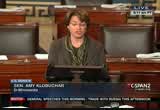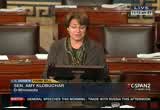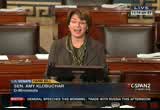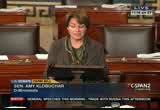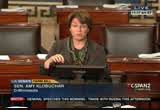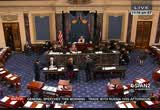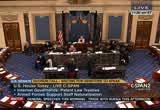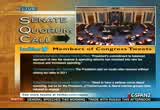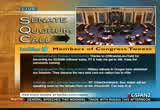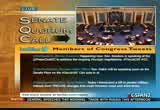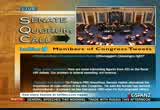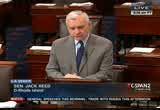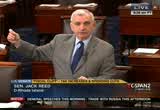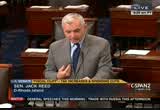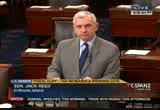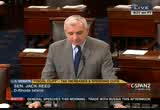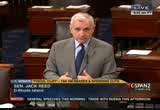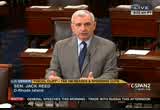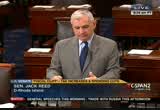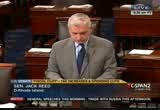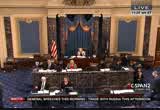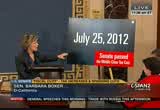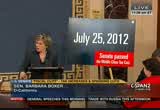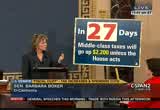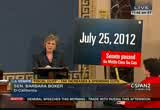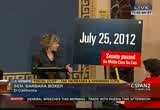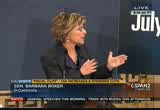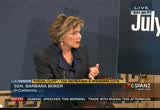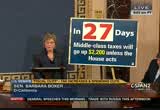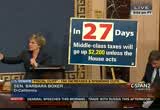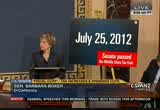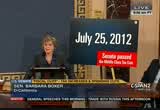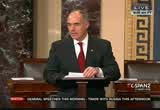tv U.S. Senate CSPAN December 5, 2012 9:00am-12:00pm EST
9:00 am
cities. and, indeed, are midlands cities. we have been generous i hope she will acknowledge, with some of the compensation as well. she asked specific points about extension to heathrow, the design of the route. i think it would be better placed for the transport secretary, and you have more to say about the route to the northwest. >> thank you, mr. speaker. new energy finance demonstrated investment in renewable energy has fallen by a half since this government came to power. would the chancellor not agree with me that what we need is to look to the future and to invest in the green jobs? and to that end, will be see to it, the 2030 decarbonization target in the energy bill -- companies in this country and
9:01 am
recommended by the climate change committee? >> well, the first thing i would say is that this government has introduced -- making investmen investments, introducing the carbon price goal which is recognized around the world as a very effective way of ensuring a decarbonization market driven way of our economy, and we've just published an energy bill and to let the control framework that would allow for new renewable investment to the rest of this decade. the industry has that, alongside the cast strategy. on the decarbonization target, as they say we're going to take a power in the bill to set a target but that would be a decision for after the next carbon budget which happens in 2016. that is a perfectly sensible and rational approach to take. >> cannot congratulate the chancellor on his statement that fair, transparent --
9:02 am
[shouting] >> is not only not rising but is falling in every year of this parliament? with 19 days to christmas, mr. speaker, can ask the chancellor which the family-friendly measures whether scrapping the fuel duty increase, freezing tax are raising the personal allowance next year he thinks will be most benefit for the family? >> what i would say to my honorable friend is with have to take some difficult decisions. we've had to take difficult decisions on welfare of bring along tax breschel, operating but i try to help families were can with the personal allowance, with fuel duty. i've tried to help business. it will be extremely welcome. >> how can the chancellor seriously attend he -- [inaudible] when the 7 billion pounds he referred to today we take up to seven years to realize at the rate of 1000 a
9:03 am
year against the rate of tax avoidance of 35 billion year? when the general anti-avoidance will be also refer to is far too narrowly drawn to be effective, and if you would listen to this, when he himself is actually now introducing a tax cut, tax havens from 23% to just 5%. >> what i would say is i don't think he's got the right figures. we are increasing the amount recovered of taxes that should have been paid from 13 billion under the labour government to 20 billion. it's an 11 billion pounds increase, and plus, plus the 2 billion i just as for today. so 9 billion pounds increase in attacks is that we collect the should of been collected. i would hope he would welcome that and support it. we've also by the way got rid of a situation which happened the leader of the opposition and the shadow chancellor where people
9:04 am
were paying lower tax rates. we've also got that problem. >> will the chancellor note that businesses in the northeast will welcome the announcement he makes today including the removing of bottlenecks on the a1 south of new castle, but they will be concerned he's not yet announced any progress on achieving -- are making progress towards north of newcastle, something which his own party promised in 1992? >> chancellor? >> well, what i would say to my right honorable friend is first of all, i'm glad he welcomes the increasing standard of the a1 program. funding to newcastle, he makes a powerful point about the a1 to the new council. i can tell them that the chief secretary to the treasury is also a powerful advocate for that road scheme. and it is one of the things that the chancellor will look at as well. so it certainly not off the cards, but what i have to mention today is the a1 -- all
9:05 am
the way to newcastle. >> thank you, mr. speaker. the chancellor we announced the creation of the business bank funding for it, which is welcome in itself. however, there is widespread comprehension among the business community of just how this will facilitate the leading to smes. county chancellor take the opportunity to explain today how this bank will fit in small businesses in a way that the existing bank structure doesn't? >> my right honorable friend will have to set up more details about the business bank. what i've heard today is the billion pounds additional capital, our ambition is that this will help get private sector capital as well. if you look at the business finance option, that's where we have taken -- [inaudible] work
9:06 am
to get more non-bank financing to medium-size companies, in particular. business bank were looking at similar models but my honorable friend will make an announcement. we will bring together all the myriad of schemes announced by various governments on business finance, which i think are sometimes confusing. they have one place they can go to. >> can i thank the chancellor profusely for him to profusely for ending the appalling delay to the building of the link, first announced to be built while the last government in 2003. this road will contribute to the economy, enabling us to contribute to the regeneration of uk? >> can i thank my honorable friend for campaigning assiduously for this. he has made a very strong case for how this new road will open up the prospect really economic
9:07 am
governments as well as dealing with traffic congestion. and it's exactly the program we can undertake that didn't happen under the last labour government because we made the switch. again, i congratulate him for the campaign he has fought which i think is -- [inaudible] >> given the falling number of nurses in the nhs, does he recognize that people view with skepticism what you said about protection to the nhs? will he acknowledge that passing on a 2% cut to local government will cut adult social services across the country? the foldable, the disabled, the elderly. >> just -- for so we provided billions more, but -- let me just say this point to the labour party. they want to be in government and they claim they want to cut the deficit. what would they cut? what would they cut? if they object to the local government settlement and the
9:08 am
object to the defense settlement and the objective the nhs budget and the object to the education budget, even though nhs schools are going up, and what exactly would they do? the problem is as was evident from the shadow chancellor's response, they didn't have anything to say on these matters but if they had a credible deficit plan then we would listen to the questions they ask us about the priorities of those plans. >> john stephenson. >> this cools and colleges of 270 million are extremely welcome. schools and colleges such as those in my constituency plans on the runway ready to take off, just in a little additional financial support. will the chancellor help those colleges and schools? >> i'm very happy to look personally at the case my honorable friend makes for his local education facility. these are of course other government departments but we
9:09 am
have provided the money for education, for new free schools and academies. and i'm sure that carlyle should be looked at. >> steve reed. >> chancellor aware because of his continuing inadequate level of funding to school building which today's statement is not correct, london councils across party body is estimating that by 2016, one in every 10 primary age children and son will not have a permanent school place? >> first of all, can i take this opportunity to welcome him to the house of commons. congratulate him on his victory. he rightly wants to speak on behalf of his constituents. what i would say is the pressure on london's schoolhouschoolhou ses, for some years is a huge issue when we came into office. we have provided additional capital spending for new school places. the money we announced over a
9:10 am
billion pounds we announced today is also to deal with areas where there's high pressure. i will make sure that my runoff on education secretary -- [inaudible] >> julian smith. >> more money for the regional growth fund is great news for yorkshire. and the chancellor give details to the house of? >> there will be more money for the region growth fund. that has been help for securing and creating up to half a million new jobs. though i'm glad to say that i'm sure businesses across yorkshire will benefit from the. we are also of course investing in enterprise zones, across yorkshire, and yorkshire businesses will benefit from the enhanced capital allowance. >> mr. speaker, seven government -- [inaudible] have proved to be -- housing starts about,
9:11 am
homelessness is a. mortgage market where people can get mortgages and rents that a record high in the private sector. has a chance or not accept his position cut 4 billion-pound investment was directly responsible for a 60% collapse in affordable house building, and we now accept personal responsibility for the chancellor of the exchequer presiding over the biggest housing crisis in a generation? >> chancellor? >> house building, house building was at an all time low under the labour government. i said i think the lowest was in 1920s and the 1930s. that was what had happened. of course things like problems in the mortgage market were greeted by the banking crisis, by the financial crisis, the banking crisis happened by the way when he was city minister over the. the funding for lending scheme is bringing mortgage costs down first by scheme help with shared equity, the new scheme is helping people who can't afford their first deposit. so we've got those schemes out
9:12 am
of. they are repairing problems in financial markets but we are also committee money for additional affordable homes and we are providing guarantees to landlords to build affordable homes. we're dealing with the problems that occurred when his party was in office. >> thank you, mr. speaker. and i congratulate my honorable friend for his statement. equally i would like to welcome the family to allow schools -- [inaudible] can he tell the house when that might be in place ?-que?-que x some areas they need is more pressing than others. particularly around -- >> he makes a powerful case for the schools and the particular school he mentioned i will make sure the education secretary is the argument he makes. the money is available over the next two years. >> what will the chancellor do to make sure that any strategy fund -- for capital projects
9:13 am
will produce jobs in scotland? [inaudible] >> chancellor? >> well, there will be additional capital spending. we have an arrangement so ill be up to the scottish government and the scottish parliament to make a decision how that money is spent. but, of course, i expect scottish members here and labour conservative and liberal democrat members to hold the snp to account for decision it tak takes, of course more broadly their independent program would be a disaster. >> families and businesses in my consecutive will welcome the news. [inaudible] wouldn't he agree with me the plan is -- [inaudible] >> i can't add much to that except i completely agree with my honorable friend.
9:14 am
>> mr. speaker, i will further mention at least a dozen tory mps getting a lot of money but i haven't heard much about the northeast getting money. [shouting] you said four or five would get an enterprise zone. will put a fence around unlock the cards. >> chancellor. >> well, can i congratulate the honorable members -- his campaign for an enterprise zone. that enterprise zone is going ahead. i congratulate him for his campaigning. [cheers and applause] and can i also, can i congratulate him as a conservative chancellor on his campaign with many other honorable members for the a1 all the way to newcastle, and, and since i know -- as i said to the members, that actually we are
9:15 am
looking as well in dealing in north scottish border as well. that is for another time. >> mr. gordon birtwistle. >> could i congratulate the chancellor on that issue on capital allowance lex i think that will be a good riddance. the aerospace industry across the world over the next 20 years will be investing between six and $7 trillion on new airplanes. this country is the second biggest airspace provide in the world. this is twice the capacity we have now. does potential agree with with me we must continue to invest in advanced manufacturing aerospace and most like to get more people involved? with the agree with me that we should carry on with this? >> well, i completely agree with my honorable friend. i congratulate him on the work he has done to make the case for capital allowances to help small and even sized businesses in lancaster, in his constituency.
9:16 am
he regularly reports on which i thought was compelling and put work into listening to his local manufactures. he's completely right about manufacturing. i've lived through some very high tech manufacturing businesses in north lancaster which may composed some of the most up-to-date jet engines in the world. we are investing more money in the aerospace flight chain. we're also as i announce today investing more money in advance manufactures light chain, and with help of my right honorable friend, the business secretary, we are determined to make sure britain is the premier place in aerospace is maintained. >> when you look at the small print you see the only reason that borrowing has fallen this year is because the government has added in the process 4g mobile spectrum. this year's figures even though government delays option is not yet taken place. and if those figures were not added income if he didn't have that three and a half an ounce pencil in for the receipt from
9:17 am
the, borrowing would actually be 2 billion higher this year than it was last. is that the case of? [shouting] >> the deficit and borrowing is falling anyway you present the public safety. we have done that in a completely transparent way. and as i was explained to the shadow chancellor, the 4g money has been used to refurbish the further education college. >> i thank you, mr. speaker. and i warmly welcome the announcement with regard to the government support for the northern extension? it's very important development. and would he agree with me not just the 16,000 homes and a 25,000 new jobs, it's also the message that high profile scheme like this since up to the world beyond the uk that britain and london are open to business? >> chancellor. >> the powerplant development is as i said in my statement as big
9:18 am
as the olympic park. it's an enormous project, and we are very pleased that we have our malaysian partners investing in the site. we've done our bit by providing this loan and this guarantee that will help the northern line extension, pay for the northern line extension. i want to also commend my honorable friend. i met with her to the site and i know what an enormous business, not just for constituents but for the whole of london and, indeed, britain. >> of course i welcome the chancellor's confirmation on ultrafast broadband for digital and the arrangements on the carbon -- [inaudible] as well. but i'm afraid of personal taxation, on benefit, the chancellor is becoming something of a fiscal drag artist. on another tax problem, tax fund, yes cut through all the jews rate against -- [inaudible] but surely it needs to be more robust. if it is going to be a
9:19 am
meaningful priority, let's say to coordinate against corporate tax conjuring, surely has to start a reason to think the controls -- that he made in the last budget. >> first of all can i thank him for the support he has given for the decision to provide ultrafast broadband, and i want to congratulate the city for a very, very good did which competed against other bids across the uk. he's also right to say that we are helping the northern islands energy sector with decisions on the carbon price which i detest a semi-statement to announce but are in the book. am glad he acknowledges those. any more broadly what i would say to him is northern ireland will benefit, the rest of uk will benefit when we help people and work hard and want to get on with doing that with personal allowance, when we help people who are small businesses with fuel duty, we're doing all these things making sure they are outlined to the northern ireland's.
9:20 am
>> with income tax cut, the 25 million people come with people on minimum wage having seen their income tax cut in half, and with up to 2 million individuals taking out a tax altogether, with my right honorable friend not agree with me that our government and, indeed, our party is on the side of ordinary working men and women? [shouting] >> chancellor. >> i completely agree with my honorable friend. we hate -- we have taken difficult decisions. we've asked the rich to pay more. but as i say, we're doing this to do with the deficit but also to help people work hard and want to get off, and that's precisely what we've done today. >> the answer the chancellor gave to my honorable friend, will he admit and 2010 he cut public spending in the northeast by 2.6 billion? last he gave us -- [inaudible]? this year it is 3%.
9:21 am
far from being said, doesn't this -- from the north to the south of? >> first thing i would say is that capital spending under this government is higher than the plans we inherited from the last labour government. that they support in the last labour budget and, indeed, we have added to it today and public investment as a share of gdp is higher under this government than it was under 13 years under the last labour government. when it comes to invest in the north, there's investment in the a1. the investment in high speed to make. there's investment in the northern rail have. there's a whole load of investment of transfer ever such a of the north and the north east, and is precisely because we are helping this country which suffered so much under labour government and whether cabot when the north and the south grew. >> i congratulate my right honorable friend for announcing the abolition of labour's
9:22 am
expected -- [inaudible] but can ask my right honorable friend with impact is going to be on the schemes that are going through approval that we've agreed already, such as the replacement for the royal national orthopedic hospital in my constituency? >> well, we are not sent any to disrupt those existing -- although there aren't sal there aren't some because they basically dried up at the end of the last labour government. there were financing problems. and actually the new tfi, pf two will actually i think help we start private and public investment. but the big difference is in so the public sector bearing the risk and demanding of the reward, in southeast london for hospital project, from now on the public sector will share any outside as well. >> can he confirm capital spending -- [inaudible] less than a third.
9:23 am
>> capital spending is higher than from the plans we inherited from the last labour government. that's simply the case. we inherited big planned cuts in capital spending. we've increased capital spending also plans, and we got this new money for schools, and i would hope that she would want it. >> i wonder if my right on up and would confirm if someone getting 10,000 pounds would have paid -- national insurance conjugations in income tax in 2010 and 11, or paid 380 pounds in 2013-14? those on the side of the house support people and families on low income, unlike the party opposite. [shouting] >> i think my honorable friend speaks very powerfully about how we have helped people, help people basically tax rate payers come with health and by increasing the personal
9:24 am
allowance. we've taken 2 million of the lowest paid out of work. but above all we have just help working families across the country with for the income tax cut today. >> mr. speaker, one glimmer of good news was the announcement of broadband, but very bad news about the tax are desperate not only will it bust our climate target but also it simply isn't she. you've got see the i comment international energy agency also do gas prices will rise. this is the government that likes to make evidence-based policy. so why won't they look at the evidence on this? >> first of all, i'm glad she welcomes the broadband for brighton. what i was young energy is we are increasing investment in renewable energy. we sent a letter to control framework out to 2020, a longer timeframe than any government before us has done. that will increase the investment renewable energy she wants to see but i think it's also fair that britain has a mix of energy sources. gas is part of that.
9:25 am
gases more, of course than the coal-fired generation business being phased out. what we want to do is have a proper mix and you'll begin to keep those down well at the same time allowing investment into new energy infrastructure. >> david ruffley spent we are facing a challenge saying two heads are better than one. [laughter] that applies economic policy. [laughter] >> i'm not sure they will be such -- after the shadow chancellor's reply. the point i would say is that we don't need to guess what the economic policy of the leader of the opposition at the shadow chancellor might be because we have lived through it. the biggest boom and the biggest bust in history despite advising then chance of the time -- [inaudible] >> will the chancellor confirm the only reason he was able to
9:26 am
save, say today that borrowing was less this year was because of the inclusion of the proceeds from the 4g sale which hasn't actually happened yet? can he simply confirm that to the house of? >> as i said, first of all we set up public finance numbers on all, under all different scenarios. we are spending to 4g money. we're spending the 4g number. for example, on the further education college in morley, and, indeed, using the money for the annual investment allowance which starts at the beginning of january. [inaudible] >> mr. speaker, hundreds of thousands of firemen, police officers, nurses and health workers across country will be very pleased that my right honorable friend today has ruled out a pay freeze. teachers however may have some concerns. kenny assures that new teachers
9:27 am
for example, -- [inaudible] within the profession? >> what i would say to my honorable friend is we asked the pay review body's to do reports. we adopted by the recommendations. my honorable friend the education secretary will set out more details of how we will implement the teachers pay review body, but it doesn't for the operating of the minimum or maximum bands in line with the general public pay policy. >> the announcement -- [inaudible] is very welcomed. can the chancellor give me assurance that it will not be paid for by existing programs? [inaudible] >> well, and i give the honorable lady confirmation that this is additional capital
9:28 am
spending, doesn't come as a substitute for any other capital spending in transport. but what i would say to her as well is that we also, i can mention this statement, it's in the document. were also providing money for the pipeline of developing new road schemes as well to make sure that the develop of new schemes in the department is not squeezed out by the capital we're giving to the existing road schemes. >> does my right honorable friend -- he has abolished labour -- cut the rate on fuel duty at new levels. as a result, typical motorists across the country will from january be paying five pounds plus every time they go and fill up at the pumps. [shouting] >> well, my honorable friend is absolutely right, and i guess we are used to opportunities for the opposition but there's no greater opportunities than on fuel duty because the fuel duty rise is that we have canceled were not things that were just
9:29 am
in some mythical plants. they were voted for by labour mps in the last labour budget. including across the shadow chancellor. my friend is right, it was cheaper if we followed the shadow chancellor's budget. [inaudible] >> i didn't realize you were calling me. yes, i, i want to come back to answer the chancellor gave on the tfi. he slipped the new pf i to scheme out today with the items to do. but isn't the case the criticisms are made that isn't good value for money, value for money will actually fall, that will cost the taxpayer more than most of the schemes will still be off the balance sheet of the government? what has changed? >> well, i don't accept that all that relation. first of all i talked about in the statement and, of course,
9:30 am
expect people to look in detail of the document we publish. i would say there are two substantial change to the first is to be public sector investment alongside private investment to the public sector will share in equity. and it will have representation on all of these projects. to make sure that we share in the upside and we know is going on in the schemes instead of the absolute scandal we saw under the last government was basically the public sector was ripped off on too many occasions and fantasy we're living with the consequences in hospitals in the southwest of london. sorry, southeastern blunder. the second, when it comes to off-balance-sheet what i will say more about in the budget is how we are going to account for any off-balance-sheet. there will be more on balance sheet. and we will have new off-balance-sheet totals and control title. i will send that out as there is more transparency. >> wrapping up our coverage here with a statement on the british economy as the u.s. senate is about to gavel in this morning. they will likely spend more on
9:31 am
general speeches. the now to live coverage of thewill senate here onth c-span2. the chaplain: let us pray. god, you have truly been good to us. even when we stumble and fall, your mercy continues to sustain us. lead our lawmakers to realize that the abilities you have given them are only maximized when they are used for your purposes. show them the best way to use their talents and opportunities to honor and serve you. lord, keep them from being so mired in
9:32 am
political gridlock that they fail to do what is best for this land we love. may they speak today words that are constructive and helpful, bringing encouragement as well as vision to their work. let your glory be seen in this place. we pray in your holy name. amen. the presiding officer: please join me in reciting the pledge of allegiance. i pledge allegiance to the flag of the united states of america and to the republic for which it stands, one nation under god, indivisible, with liberty and justice for all.
9:33 am
the presiding officer: the clerk will read a communication to the senate. the clerk: washington, d.c, december 5, 2012. to the senate: under the provisions of rule 1, paragraph 3, of the standing rules of the senate, i hereby appoint the honorable kirsten e. gillibrand, a senator from the state of new york, to perform the duties of the chair. signed: daniel k. inouye, president pro tempore. mr. reid: following leader remarks, the senate will be in a period of morning business for up to four hours. the reason for that is we've been on the defense bill for a considerable number of days, and people haven't been able to come and express their views on a number of different issues, so we're going to extend that morning business for a longer time thank normal. following morning business, about 2:00, we'll begin consideration of h.r. 6156, the
9:34 am
russia trade bill. we hope to complete action on this that bill today. madam president, across the country, americans are lamenting that lack of progress in negotiations to avoid a massive tax increase on middle-class families -- and i really share that frustration. consider yesterday's failure, the disabilities convention at the hands of the tea party. this shouldn't have been a battle, but extreme elements of the republican party picked a fight where there was nothing to fight about. 38 republicans voted against the convention, including several who are on record supporting it, even cosponsors of it. this treaty already ratified by 125 countries would hold foreign nations to the same high standard of treatment that the united states already maintains for people of disabilities. and it would sative american
9:35 am
citizens traveling and working abroad, and that's hundreds of thousands of people right now. the treaty has the support of veterans groups, disability groups from around the country, virtually all of them. it wouldn't cost the taxpayers a single penny. it wouldn't require any changes to existing united states law, and the issue is as bipartisan as they come. here's what one senator said about the treaty, and this is a quote. protecting the rights of persons with disabilities, any person is not a political issue. it is a human issue you regardless of where in the world a disabled person descrierves to live a normal, independent life, where basic rights and accessibilities are available. disability rights and protections have always been a bipartisan issue and ratifying this issue should be no different." madam president, this wasn't some ultra liberal speaking. it was senator john mccain, a disabled veteran, a hero from
9:36 am
the vietnam conflict, who broke with extremists and tea partiers and voted to ratify the treaty. the convention also has the strong support from a number of other leading republicans, including george h.w. bush, the first president bush, who by the way of course was a world war ii veteran, did heroic things during that war. and it also has the support of former senate majority leader bob dole, certainly a patriot. senator dole, a disabled veteran from world war ii, who led the fight to pass the treaty, was here yesterday urging republicans to support it. now, mr. president, think about that. robert dole, who was grievously injured in world war ii, spent more than two years in a hospital, he came to this senate floor, and the first speech he gave was on disabilities, and we
9:37 am
needed to do something about it. he was here -- he led the fight to pass the treaty, urging republicans to support it. a few republicans greeted him as he was in his wheelchair here. they greeted this 89-year-old war hero, i repeat, patriot, who just last week was in walter reed hospital. then one by one, all but a handful of them voted against the treaty, ensuring its failure. but their professed reasons for opposing it had no basis in fact -- none. most republicans acknowledge that. some use an excuse, well, it is a lame duck. we shouldn't be doing it in a lame duck. i mean, wow ... and there's no justification for sending a message that every individual around the world who strives to lead a productive life in spite of a disability
9:38 am
does not deserve the same justice treatment. there is a he no justification for telling disabled americans, especially those who have sacrificed their bodies for our freedom, our veterans, that they don't deserve the same protections abroad they do here at home. yet that's the message 38 of my republican colleagues sent yesterday. and these are the same republicans with whom democrats are supposed to reach an agreement to protect middle-class families from a tax increase. it is difficult to engage in rational negotiations when one side holds well-known facts and proven truths in such low esteem. hopefully compromise is not out of reach, but as negotiations continue, i hope my republican colleagues will keep in mind the ofoft-repeated word of daniel wo in/-- daniel moynihan.
9:39 am
"you're entitled to your own opinion, bu but you're not entid to your own facts." there's still are a quick, easy way out of this. the house must take up the senate-passed middle-class tax cut. a few reasonable republicans who are left agree we need to give certainty to middle-class families now. yesterday olympia snowe, a very courageous legislator for more than two decade decades who is retiring, said congress should fight about tax rates for the top 2% after we've reassured the middle class. americans should not even be questioning, she said, that we will ultimately raise taxes on low- to middle-income people. that's her quote. but, madam president, people are questioning this. if house republican leaders allow a vote on our legislation, it will pass. every democrat will vote for it. it will only take 26 republican
9:40 am
votes. it is a huge body, 435 members. they only need 26 -- 26 republicans -- for this to pass. and i know there are 26 republicans who would vote pour this. we had one conservative republican who has said serving in the house, more than half would vote for it. so i believe there are 26 reasonable republicans willing to put their promise to serve constituents ahead of their pledge to serve grove norquist. so i say to my friend, john boehner, the speaker of the house of representatives, you control matters on the floor. no one else does. you have the ability and you're the only one that has the ability to put this on the floor for a vote. he should do that. that would be the american way. would the chair announce the business of the day. the presiding officer: under the previous order, the leadership time is reserved. under the previous order, the senate will be in a period of morning business for up to four
9:41 am
9:43 am
ms. stabenow: madam president? the presiding officer: the senator from michigan. ms. stabenow: thank you, madam president. the presiding officer: we are in a quorum call. ms. stabenow: i would ask suspension of the quorum call. the presiding officer: without objection. ms. stabenow: thank you. madam president, i rise today to once again speak about the fact that in july -- july 25 of this year, the senate passed a middle-class tax cut bill guaranteeing that the first $250,000 of income that any american has would be exempted from any tax increase. now, we all know that the vast majority -- in fact, 98% of americans -- make less than that amount of money. so we are talking about 98% of americans receiving tax cuts under that proposal. back in july, we passed this proposal, and it is now still waiting in the house of
9:44 am
representatives. so far the house leadership has refused to even let the bill come up for a vote, even though we all know that there are a majority of members in the house that would vote for this and guarantee that, as we go into christmas, middle-class families across america would know that they would have $2,200 in their pocket, more in their pocket right now next year than they will have if their tax cuts expire. so we have passed this, and we are urging the house of representatives to do the right thing and to pass this bill. even republicans in the house say they support this effort. we all know that representative tom cole from oklahoma said last week, "i think we ought to take the 98% deal right now." pretty good deal. let's start -- we know that we have a large deficit-reduction effort that needs to take place.
9:45 am
there's a lot of give-and-take that needs to take place. we know what the elements are. but let's do step one, which is something that overwhelmingly we agree with. the senate has passed it on a bipartisan basis. there's enough votes in the house of representatives. let's just get that piece done and not hold middle-class families hostage to the idea that the wealthiest among us should get additional tax cuts. let's just agree that 98% of families in america should be secure in knowing they're not going to have $2,200 more taken out of their pocket next year. now we have just a few days to get this done. in fact, we have right now 27 days until middle-class taxes will go up.
9:46 am
27 days until we will see taxes go up for middle-class families. so this needs to get done now. there are numerous house members now agreeing with us, republican house members. and i commend them. in addition to representative cole, representative walter jones from north carolina said yesterday he would vote for the senate middle-class tax cut bill. representative steve latourette, representative charles bass, representative mary bono mack, representative mike simpson. representative robert dole have all said that the senate plan is a responsible approach that protects middle-class families from a massive tax hike. so we now have a situation where the democratic leader in the house is putting forward a petition. let's call it the discharge petition, as our distinguished presiding officer knows and as i know, having been house members,
9:47 am
that if a majority of the house signs a petition, then you can essentially force a vote even if the speaker and the republican leadership don't want to bring it up. so i'm hopeful that 218 members on both sides of the aisle will sign this petition and we will be able to guarantee before christmas to middle-class families across this country that they're not going to have to worry about spending $2,200 more next year on taxes. we need to just get this done. and i'm hopeful that the house members will sign the discharge petition if the speaker does not take this up. what does this $2,200 mean? it's the difference between paying the bills or not. it's the difference between getting ready for christmas and buying the tree and the decorations and the presents. for so many families these days, we're back doing lay-away, which we were doing for me when my
9:48 am
kids were little and we were trying to budget and figure out how to do things and you would pick out something back in september and do lay-away and hope you could pay for it so that your kids have the christmas you want to have for them. families are doing that today, budgeting every single dollar that they have to make sure they can have the christmas they want to have for their children. as they're budgeting all that, they need to know they don't have to budget starting in january, a tax increase, which is what will happen if the house doesn't act within the next 27 days. so, one constituent of mine indicated to me that that $2,200 was four months of her grocery bill. that's a lot of money. four months of her family eating is what we're talking about. now we've also figured out that $2,200 would buy you 650 gallons of gas. for the average commuter, that's
9:49 am
enough gas to get you back and forth to work every day for three years. that's a lot of money, 650 gallons of gas, $2,200. $2,200 will buy families in michigan 550 gallons of milk for their family. so we're talking about a significant amount of money for the average middle-class family, those aspiring to get into the middle class, those struggling across the country. this is a lot of money for families that we're talking about. and republicans in the house can stop this tax increase if they want to. they have 27 days to do it. 27 days to stop a tax cut, a tax increase on middle-class families. 27 days to stop an increase, make sure $2,200 more is not
9:50 am
taken out of the pockets of families next year. let me stress again as well that we're talking about middle-class tax cuts that would allow every american to get a tax cut on their first $250,000 of income. the majority of people, in fact, 98% of americans, that is their income or less. they don't make more than $250,000 a year. but for everybody who does, it would continue to make sure that your taxes don't go up. but for those above that, we would say you know, for the last decade you've had extra tax cuts, and we're going to ask you now in the face of the largest deficits our country's ever seen to do your part, to share in solving the problem. and i know an awful lot of people who are ready to say absolutely, i want to do my
9:51 am
part. and that's what we're talking about. those wealthiest few being at the table to do their part to make sure we can solve the biggest deficit crisis we have had as a country. so, we are talking about every american earning $250,000 or less, or the income of $250,000 or less being exempt from tax increases. and that covers 98% of americans. there is agreement on both sides of the aisle. i want to congratulate and appreciate very much senator snowe's comments when she indicated that we should just get this done. she said americans should not even be questioning that we will ultimately raise taxes on low- to middle-income people. we should take it off the table while grappling with tax cuts for the wealthy. and i couldn't agree more that
9:52 am
we are going to miss senator snowe here in the senate. but she, as usual, is right on the money in terms of the common sense of this situation. the senate passed in july a middle-class tax cut bill. we now have, i believe, the majority of the house of representatives and a bipartisan basis who believe middle-class taxpayers should get tax cuts next year. the house needs to bring it up and vote on it now so we get that off the table. step one. and then of course we have larger issues that we have to agree with. we have to sit down and come together on. last year we agreed on $1 trillion of spending reductions. this gets middle-class taxpayers
9:53 am
off the hook being held as pawns, held hostage to whether or not the wealthiest among us will get additional tax cuts next year. let's just say middle-class families get $2,200 next year, get to continue their tax cuts, and then we'll go on to the next thing. it seems to me -- and we saw this as we were doing the farm bill. you don't have to agree with everything to do something. you start with what you agree on. everybody says they agree that middle-class families in this country should get tax cuts next year and beyond. let's just do it. what are we waiting for? let's do that and then we'll look for the next set of issues that we can agree on to be able to solve the large problems that we have in terms of our fiscal situation and economic growth, by the way, because we will never get out of debt with 12 million people out of work.
9:54 am
so we bet continue to be focused on jobs, which i know a huge focus for, our caucus, making sure that people can lift themselves out of poverty into the middle class and have the opportunity for a good-paying job for themselves and their families. we've got a lot of issues to talk about. but everybody says they agree that middle-class taxpayers should not get $2,200 more in a tax increase next year. ish why don't we just do it? we shouldn't have to run this clock out and get closer and closer to the holidays, closer and closer to christmas where families don't know what they're going to have to budget for next year. let's just do it and let families know that we can actually work together and get things done, because that's really what people are asking us to do. i believe that's the message of this election, that people want
9:55 am
us to sit down and be reasonable and work together. they also sent a message through the reelection of our president, who campaigned, saying that the wealthiest among us should be part of solving the problem, can afford to pay a little bit more in order to make sure we're not asking middle-class families to have the entire burden of resolving the deficit in our country. the president won, the public said common sense says everybody ought to be participating, not just middle-class families and senior citizens who have been hit the hardest in the recession. everything has happened in the last decade. they have been hit the hardest on, carried the brunt of it. now we're saying, you know what? everybody ought to be in this as americans. we all benefit from this great country, the blessings of this country, and everybody ought to be a part of the solution.
9:56 am
i believe it was a very strong message. i believe it was a very strong message to say that people want us to work together. but i also know in looking at the proposal that the speaker has given, by saying we're not going to raise -- we're taking off the table any effort that would stop more tax cuts for the wealthiest among us instead what we want to of course on is closing loopholes and deductions, that that's a nonstarter because that falls right back on the middle class again. home mortgage deduction, college deduction. the mortgage tax relief bill that i have that makes sure that we in a situation on a short sale or another situation where a family is coming to some agreement with the bank on loan forgiveness, they don't pay taxes on that as income. so we have a whole range of what they call tax deductions that
9:57 am
fall smack dab on the middle class and that's a nonstarter. in conclusion, let me say, madam president, again, that we have 27 days to stop a tax hike on middle class families across america. $2,200 that will hit people next year. it makes no sense. you pass the senate bill, you are guaranteeing that 98% of the american people don't have a tax hike. we need to get it done. and i would urge in the strongest possible way that the speaker bring this up right away and pass it. thank you very much. the presiding officer: the senator from illinois. mr. durbin: i ask consent to speak as if in morning business. the presiding officer: without objection. mr. durbin: thank you, madam president. i want to thank the senator from michigan for leadership on this issue. 21 days until christmas. 27 days until cliffmas. that's the fiscal cliff,
9:58 am
december 31. people are counting down. two-thirds of americans are watching this debate on capitol hill because it affects every single family, every individual. and you think to yourself, could congress possibly step back and let taxes go up on working families? what are we thinking? we know what they're dealing with. many of working families across america struggle paycheck to paycheck. the pew institute did a study last year and asked working families how many could come up with $2,000 in 30 days for an emergency expenditure. it's easy to imagine one. a car repair, a quick trip to the hospital emergency room, $2,000. only half of working families could come up with $2,000 in 30 days. that shows how close to the edge many people live. so now we have before us the
9:59 am
possibility that these very same families struggling with these issues are in fact, are in fact going to see their taxes go up december 31. there's one person who will decide that: speaker john boehner, the republican speaker of the house of representatives. why am i putting all this on poor john boehner? a congressman from ohio, from a working family himself. because it's within his power to call before the house of representatives a measure that passed the united states senate last july. we passed on a bipartisan vote a measure to protect all families making less than $250,000 a year from any income tax increase on december 31. sent it over to the house of representatives. in july, and speaker boehner has refused to call this measure
10:00 am
that would protect working families, and as a result, if he does nothing, their tax bill will go up $2,200 next year. how do you explain that? it's not only unfair to those families who are working and struggling, it's really not a good thing for this country. all of us know the issue of income and equality, how many working families are falling further and further behind every single year debt ceiling -- every single year despite their best efforts, despite their hard work. we also know many families are looking ahead and wondering how in the world are we going to pay for a college education for our kids or maybe even stay in their homes.those are life-and-death, day-to-day, paycheck-to-paycheck decisions that many families make. the failure of speaker john boehner to call this bill for a vote in the house of representatives before december 31 endangers our economy.
10:01 am
that's right. the failure to pass this bill in the house of representatives before december 31 will endanger our economy. why? because we are in the midst of recovery from a recession, people are getting their jobs back, businesses are getting a little stronger, but if speaker boehner refuses to call this measure -- this bipartisan measure that passed the senate, and we see a downturn in consumer confidence because people think that their taxes are going up, if we see a downturn in consumer purchasing because people aren't sure about that next paycheck, then we're going to see a stall in this economy. it'll be speaker boehner's stall, and it's not something that he should take lightly. this is a delicate recovery moving in the right direction, but if it's going to gain strength, there has to be some certainty, and it should start
10:02 am
with the passage of this mabe -- of this measure. the house republican leadership is bargaining with the president right now. the president said the wealthiest of us who have realized the american dream should be willing to pay a little bit more so others get a chance at the american dream. that's not unfair. many of us believe yes, we owe it to our kids and to the next generation to give them a fighting chance. if that's going to happen, then speaker boehner and the house republican leadership have to take this very seriously, very quickly. now, i understand the pressure the speaker is under. i guess my colleague, senator mccaskill of missouri, said it very effective and concisecy last sunday on one of the talk shows. she said, it is a hard political choice for john boehner. he has to decide, she said, what is more important: the survival
10:03 am
of his speakership or the surriflsurvival of this nation. that's a pretty stark choice but not a hard choice for a real leader. i'll say this to speaker boehner: if you step up and do the right thing for the working families across america, if you step up and do the right thing for this country, democrats will stand with you on a bipartisan basis to make it happen. and that's the only way that we're ever going to achieve the right result in this debate over the fiscal cliff. so we call on speaker boehner, before you go home to relax in ohio for christmas, let families across america relax knowing that they're not going to see their income tax rates go up on january 1. this is worth $2,200 to the average family in my home state of illinois, and i say to the speaker, it's worth that to families across the united states. for the good of this nation, for the good of the economy, for the good of these working families,
10:04 am
for goodness sakes, pass this measure, this bipartisan measure that passed the senate last july. get this part done. we can debate the rest, but give peace of mind to meese working families and -- but give peace of mind to these working families and middle-income families that they're not going it see their income tax go up. madam president, i yield the floor. madam president, i ask unanimous consent to speak on a separate issue to be placed in a separate place in the record. the presiding officer: without objection. mr. durbin: madam president, it was a disappointing day yesterday when the united states senate failed by five votes to pass the convention on disabilities. it is a measure that i'd worked on with former california congressman tony coehlo, who has
10:05 am
been an outstanding advocate for the disabled in america. throughout his career in congress and since. but it was also an effort toker one particular end -- for one particular friend in illinois, marco bristo, confined to a wheelchair, this woman is everywhere, all the time, working night and day to help the disabled in my state and around the nation. she came to me as well and said, can you help pass this convention on disabilities? and i said, it's going to be hard because a lot of members just don't want to take up a measure and consider something like this. and she said, we'll put together a strong group supporting it. when it was over, virtually every veterans organization in america supported this convention on disability. and in addition to that, every disabled group -- disabilities group also endorsed it. the chamber of commerce and so many others, because 125 nations
10:06 am
had already ratified this convention on disabilities. what is it? it's are a treaty that was drawn up by george herbert walker bush and signed by hum but needs to be rat -- by him but needs to be ratified by the senate. and we failed to do it. years and years have passed since president bush, and we haven't taken it up. 125 nations took it up and passed it, but not the united states. there was one real champion for this yesterday, and he came to the senate floor, and it was good see him again. what an outstanding man and individual -- senator robert dole. we've had our differences politically, but i'll tell you what scott dot ... i am an an admirer of his. a veteran of world war ii, he came back having been shattered by that war, and built a life of public service that he gave to the people of kansas and here in the united states senate chamber. he and his wife, former senator
10:07 am
libby dole, came to the senate. i looked to the side and i thought, we've got to do this for bob dole. this man speaks for disabled veteranveterans and the disabled community. he was with our senator tom harkin, one of the lead persons when it came to passion the americans with -- to passing the americans with disabilities act. it was a solemn moment in the senate with senator dole sitting right there in the well begging his colleagues to pass this disabilities convention, maybe his last lobbying effort that he would undertake. it meant so much to the dole family and to robert dole. he came to the floor and we called the measure, and those who witnessed it will remember that most members came and sat in their chairs to cast a vote, which is rare here, and it really tells the story that this was more than just an ordinary, routine vote. we listened as the roll call was made, and we watched the
10:08 am
senators stand and vote, and then toward the end i turned to tom harkin who was sitting right over here and i said, we don't have it, we missed it. we did. we failed to ratify this by five votes. 61 votes. we needed 66 votes because senator kirk is antibiotic because of illness -- is absent because of illness. 66 votes we needed to pass this. there were only eight republicans that would stand with all of the democrats to pass this convention on disabilities. senator john mccain led that effort, john mccain, a person who knows the cost of war and the price that's paid and who showed real, extraordinary political courage. nsenator john kerry, another vietnam war veteran, stood up for him. what a disappointment. what a disappointment that the
10:09 am
united states senate, which on a bipartisan basis passed the americans with americans with disabilities actamericans withdn the 90 votes 22 years ago, whih would not infringe on our freedoms in any way, that we couldn't pass that on the are senate floor. what a sad testament to what has happened to the united states senate in the last two decades that a man like bob dole would witness this. i'm sure it broke his heart. it broke mine, too. i went out afterward and saw the disabled gathered in the lobby out here. many of them were crying. they couldn't believe it. at a time in america when we are giving the disabled chances they've never had, opportunities they've deserved for decades and generations, that we would turn down this convention on disabilities here. it was a sad moment in the history of the united states senate. that only eight republicans would join every democratic senator in voting for the ratification of this treaty on disabilities. some of these colleagues may
10:10 am
have another chance. maybe next year we'll have another go at it. i certainly hope senator dole will be here to join us and see that happy day. but yesterday was a sad day for the senate, a sad day for our nation. we owe a debt of gratitude to the disabled, who work so hard, to the disabled veterans, who testified and worked so hard for the passage of this, and we owe it to them and disabled around the world to give them a chance, a chance for an opportunity which has become the law across america and needs to be the law across this nation. whatever the petty political squabbles were that led to this vote yesterday, we need to put them behind us. it is important for us in the 21st century to speak as one on a bipartisan basis for the disabled. i yield the floor. mr. hatch: madam president? the presiding officer: the senator from utah. mr. hatch: madam president, in less than a month, american taxpayers face the greatest tax increase in our nation's
10:11 am
history. two years ago the president and the senate democrats opted to postpone these tax increases for two years. they did so knowing that raising taxes in a weak economy is an unnecessary and counterproductive jolt to the system. 40 democrats supported doing that. since then, however, the president has been singleminded in arguing for tax increases on certain wealthy taxpayers. he and his democratic friends promoted these tax hikes in the name of a so-called balanced approach to deficit reduction. and now, with the country fast after pproaching the fiscal cliff, it's time to pay the piper. but as the president issues ultimatums about what kind of tax increases are necessary to avert the fiscal cliff, it is worth noting that he has abandoned any pretense of seeking a balanced approach to deficit reduction. last week's proposals in the white house amount to little
quote
10:12 am
more than a massive set of tax increases. by the way, far in excess of the tax hikes that he ran on or anything that senate democrats would support coupled with new spending. even democrats don't support what he called
10:13 am
new taxes to reduce the deficit. they will instead use it to pay for larger government, more public workers, and more government waste. we need to have a serious conversation about our federal debt, which is now over $16.3 trillion and going up every day. how do we get that number under control? the president and his democratic
10:14 am
support them have refused to engage. all they can saall i can say ree here, we're ready to talk, we're raid to reach a balanced resolution that would spare the american people from the consequences of going over the fiscal cliff. and, madam president, i've only been here 36 years, but i've seen every president willing to meet on a regular basis at budget-crunch time with people on both sides of the table over and over and over again until they gradually whittle it down to where they agree. i haven't seen that with president obama. i've seen heard democrats complain that he never talks to them. we cannot do this kind of work without very, very strong presidential effort. that's what presidents are for. and it can't just be laying down
10:15 am
a gauntlet sand say, you can't -- and say, you can't cross over that, or drawing a line in the sand. we need -- you got two programs now. and those two sides need to get together. and that includes the president and whatever democrats he cares to put in the equation and also speaker boehner, leader mcconnell, and others. as we attempt to reach a meaningful resolution of this debate in the coming weeks, there are three guideposts that i will keep in sight. first is the cliff itself. going over it would be the height of irresponsibility. and according to congressional budget office, going over the cliff will reduce g.d.p. to a negative .5% next year. throwing us back into a recession and causing unemployment to surge to 9.1% or more. but it seems increasingly clear that the president and democrats
10:16 am
in congress are content to go over the cliff regardless of the outcome. i can't believe that that's so, but i've heard them say it. they think they have an advantage if we go over the cliff. well, i hate to tell you, there will be no advantage to that. leading democrats have expressed on several occasions their openness towards going over the cliff. the question is why. why would the president do this? why would democrats jeopardize the livelihoods of hundreds of thousands of american workers and the economic security of their families? why are they putting raising tax rates on a few ahead of well-being of all? republicans are working to avoid this outcome. we want to avoid raising tax rates because we know once they're raised, they'll stay there or there will be another demand next year to raise them higher. we have a good argument for that. we believe it hurts the economy by harming incentives to work,
10:17 am
save, and invest. republicans expressed some willingness to work with the president to raise revenue without raising tax rates, but the president refuses to budge. after all, he argued during his reelection, that the deficit-reduction math does not work otherwise. now this leads me to my second guidepost in this debate. it is the president's math that does not work, and his math is off in a multiplicity of ways. let's start at the beginning. last year's deficit was $1.3 trillion. next year's deficit is likely to exceed $1 trillion for a fifth year in a row. so what would the president's tax hike proposal raise in terms of revenue? what would it have done to last year's $1.3 trillion deficit and what would it do to reduce our debt over the long term?
10:18 am
if all of the 2001 and 2003 tax relief were to expire, it would reduce the deficit by $426 billion over one year. to put it another way, the full extension of the current bipartisan tax relief would cost $426 billion over one year. now that's a lot of revenue. but the president and congressional democrats, or at least most of them, have no desire to see all of this tax relief expire. in fact, their plan, should we go over the cliff, is to reinstate almost all of it. they say the only want to raise taxes on the rich. so how much would it cost if we extended current tax relief for everyone but those making over $250,000, which some have said is the line for being rich? assuming that the estate tax stays where it is -- and a fair assumption given the level of support for that policy even
10:19 am
among democrats -- the cost of extending all the tax relief except for those individuals would be $385 billion. given certain senators would be uncomfortable designating families making $250,000 a year as rich, it has been suggested that the current tax relief might be extended for everyone but so-called millionaires. warren buffett has said those earning $500,000 a year or more. but others have said millionaires. how much would that cost? the one-year cost of that tax relief would be $383 billion. there are a few different ways we could look at these numbers. one way is to compare the cost of the democrats' tax plan with that of the republicans. the one-year difference between the republican proposal of extending all tax relief and the democrats' proposal to raise taxes on the rich is at most $68 billion and perhaps as low as
10:20 am
$23 billion. with a deficit over $1 trillion, is the president really willing to send us over the cliff for as little as $23 billion in additional revenue? i can't believe that he is. but he is. another way to look at the numbers is to compare the cost of the democrats' actual plan with the president's stated desire to raise revenue by $1.6 trillion. he can't get that from just the rich even if he took every dollar that every millionaire earns this next year, he probably would have a little less than $900 billion. and that may be high. i look forward to some enterprising reporter getting to the bottom of this one. the president says he wants to raise taxes by $1.6 trillion and his treasury secretary suggests democrats are on board with this strategy. i don't believe that for one minute. i don't think his program would
10:21 am
pass the senate. i don't think many democrats would vote for it. i know at least 20 who won't. yet the revenue generated by the proposal supported by real live democrats seems to raise only between $353 billion and $383 billion. so here's the question: where is the president going to come up with another $1.2 trillion or so in tax increases that his fellow democrats will support? we've seen three budgets the president set up, and they haven't received one vote from either republicans or democrats. not one. well, where is the president going to come up with another $1.2 trillion or so in tax increases and be able to get democrats to support it? and i don't mean supported by
10:22 am
democrat pundits. i mean supported by the 20 democratic senators who will be facing their constituents in 2014. $1.6 trillion tax increase is lifted from the president's own budget that has been rejected on a bipartisan vote, 100% in both the house and the senate. and that budget received no votes at all, democrat or republican, in either the house or the senate. and as i said, it is the president's numbers, the numbers that secretary geithner was sent up here last week to promote, that don't add up. the president's insistence on a $1.6 trillion tax hike that is neither supported by the american people nor even elected democrats is not about deficit reduction. the president and congressional democrats think they can bludgeon republicans as a out-of-touch party for the rich because we support tax relief for everybody.
10:23 am
let me say a few words in our defense. first off, and i want to say this loud and clear, i could not care less about the financial well-being of the nation's rich, whether warren buffett is able to maintain his corporate jet is no concern of mine, although he's a friend. to continue the ability of actors and executives a summer at a lake is not on my list of priorities. when we do finally engage in fundamental tax reform, it is worth our while to look at how these super rich shelter their wealth from the full burden of income taxation while the middle class continues to suffer in both the income tax and increasingly the alternative minimum tax, which is going to hit about 28 million regular people who are not millionaires on january 1 if we go over the
10:24 am
cliff. still, i along with most of my republican colleagues continue to promote the seamless extension of current tax policy. that is because of the impact of increasing marginal rates on small business owners and the consequent impact on job creation and economic growth. we know that it's going to hit approximately a million small businesses very, very hard. most of whom put their money back into the business so they can grow and hire more people. republicans support low marginal rates because we know that by raising rates, you hamper the efforts of investors, small business owners and, most importantly, the american workers they employ. republicans are averse to rate hikes that would have a detrimental impact on people's livelihoods, averse to rate
10:25 am
hikes to reform that don't promote economic growth. madam president, we keep hearing that republicans are dogged on the issue on taxes and their resistance to increase revenues is holding back the big balance deal set by the president. this has to be one of the most misreported stories in my memory. many republicans have stated openness to increased revenues. there is a difference between revenues and tax rate increases. we republicans continue to point
10:26 am
out. but only are we with willing to be open to increased revenues as part of a balanced deal and only if revenue increases are coupled with entitlement spending reform. this brings me to my third guidepost for this debate. the president has shown a real stubbornness towards any reform of the spending programs that are the main drivers of our deficit and debt. we hear constantly about the intransigence of republicans with their antitax rate views. yet, we do not see the same front-page stories documenting the "over my dead body" resistance of richard trunka, head of the afl-cio, and the aarp toward entitlement spending structural reform, which everybody knows we've got to do if we're going to keep medicare going. i don't think anybody in this
10:27 am
body doesn't know that within ten years it will be broke unless we make the appropriate structural reforms now. the president continues to call for a balanced approach to deficit reduction, but in practice he's offering up all tax increases and no spending discipline. he has offered up nothing meaningful on entitlement reform. the proposal put forward last week by secretary geithner was embarrassing. i happen to like secretary geithner. i stood up for him under some trying circumstances on the finance committee before he was approved by the senate. and i did it because i believe he's a hard worker. i believe he's an intelligent man. and i personally like him. but my gosh, if i was the treasury secretary and the
10:28 am
president gave me that plan to go up and show it to the leader of the house, the speaker of the house, i would have said, no, mr. president, you can't do this. this is an insult. if the president said you've got to do this for me, i would say, i think it's better for me to resign at this point. it's embarrassing. and i think secretary geithner knows it. and if he doesn't, then he's not the man that i have always thought he is. that proposal did nothing to address spending aside from wanting to increase it. that's where the democrats are. i understand the democrats' predicament. right after the election it appeared the door was open, the president seemed willing to address tax revenue in a responsible manner, a manner respectful of the legitimate concerns of the house majority
10:29 am
and the 62.6 million individuals who did not vote for him. but within a week he was read the riot act by the unions and the aarp who will resist any meaningful changes to the entitlement spending programs that are now bankrupting our country. later this week i will outline a series of entitlement spending changes that could and should be supported on a bipartisan basis. the president told the american people that he wants a balanced approach. my hope is that the president comes forward on his own, with his own details on how he would fix the entitlement spending programs. and i mean real details on real proposals with real teeth. not the window dressing in the president's budget that even the democrats reject and have rejected in the past. the president has demanded a balanced approach. it is what he promised the american people, and it is what
10:30 am
we republicans are prepared to give him. if the president wants to avoid going over the fiscal cliff, he can steer us away from it. special interests and his liberal base will no doubt cry foul, but they will follow him if he will lead. and i don't see the leadership, between you and me. not to put too fine a point on it, but if we go over the cliff, it will be because the president wanted it to happen, and he thinks he'll get political points for doing it. the mainstream media, it's likely they will ignore the actual facts here. even though the president will never again run for any public office, he will have put cheap political points ahead of a reasonable deal that he claims to support. now, this is deeply sin wel deed the president should understand
10:31 am
that he will be portrayed not as a strong leader but as one who wilted, caving to special interests over the well-being of the country. when he faced the choice of tough statesmanship or easy accolades from the network and a dead-ender barricks he chosdeade latter. i am i think it's time for the president to talk to us rather than talkin talking from a toy y trying to make his points. he needs to put away his campaign talking points. he needs to engage in finding a balanced solution to our debt crisis. he needs to lead the country, and he needs to protect american small business, their workers, and their children from an increasingly dim fiscaller future. i'm concerned about it. and as i studied it, the
10:32 am
difference between the president's plan and what senator mcconnell and i suggest -- putting it over for a year, giving us a year to do -- and dea dedicate that year to tx reform -- the difference is about $68 billion. and we're going to go over the cliff for $23 billion? we'd have to be nuts. even if our illustrious media will cover it up. madam president, i yield the floor. mr. grassley: madam president? the presiding officer: the senator from iowa is recognized. mr. grassley: there's been a lot of discussion lately about how the senate is not working
10:33 am
properly. this is evidenced by even a casual observer. to understand how the senate was observed to work and what has gone wrong requires some knowledge of the history and the rules of the senate, and i would put more recommend if more empy thank the rules of the senate, particularly as expressed in "the federalist" papers but the people who are advising the states -- who were advising the states to approve the constitution. to many people this subject, no doubt, seems arcane and confusing. the simplistic explanation that we get from the other side of the aisle -- and it is a steady drumbeat -- is that republicans are filibustering everything just willy-nilly, thereby
10:34 am
grinding the snoo senate to a h. various motivations are suggested as to why republicans would do such a thing, but the point that they want americans to take away is that republicans are abusing the filibuster. this message has been repeated ad nauseam by democrats. in fact, the story goes that republicans have so abused the filibuster that the democrats have no choice but to take it away, even if it means violating the senate rules in order to change the rules. can you imagine a political party saying it's okay to ignore the rules, to change the rules?
10:35 am
in order to discuss this topic, it's very important to establish what we mean by the word "filibuster" and how it fits into how the senate operates today and has operated historically. i hope you wil you'll bear withe try to understand this because i ultimately want to get down to how the proposed changes to the senate rules threaten the very principle underlying our system of government, particularly the checks and balances within our system of government. but, first, a legitimate question: what is a filibuster? we talk about it so much that you would think it referred to a very specific activity that's easy understood by everyone.
10:36 am
you can actuallit can actually o different types of activities. this of course leads to confusion, and that confusion is reflected in some of the speeches from colleagues on the other side of the aisle -- intentionally or not. when most americans think of the filibuster, they probably think of jimmy stew arart in the film "mr. smith goes to washington" standing and talk without stopping for an extended period of time to delay proceedings and to take a lot of theater just to make a point. now, this is the classic understanding of a filibuster. unless all senators have agreed to waive senate rules, it is a fact that a senator who has been recognized to speak may retain the floor as long as he
10:37 am
continues to speak. this is the basis in the senate rules for a classic filibuster. but this is not the rule some democrats want to change. when the members of the majority party complain about how many filibusters the republicans have engaged in, they actually mean how many times the senate has voted on a motion to bring debate to a close, and that motion is called the cloture motion. when debate comes to an end, it also means, no more opportunities for amendments. if republicans don't agree to end debate and force a final vote when the majority leader decides we should end debate and vote, he calls that a filibuster. in fact, even when every single
10:38 am
republican votes in favor of ending debate, he still calls it a filibuster. it ends up in those statistics that add up to numbers and numbers that aren't very intellectually honest. and just think of republicans voting in favor of ending debate, and it's still called a filibuster. we just voted a day or two ago 93-0 to end debate on the defense authorization bill. is he still going to call that a filibuster as well? how can he accuse republicans of filibustering when he's the one who made the cloture motion? a key point. when the democrats talk about republicans launching a filibuster, it is important to note that it is the senate majority leader who almost exclusively makes the motion to
10:39 am
invoke filibuster -- or cloture. i understand it takes a petition of 16, but not very many senators i know ever initiate such a petition, unless the republican leader when we're in the majority or the democrat leader when they're in the majority provoke that. this means that the number that the majority leader is so fond of quoting as the number of so-called republican filibusters is really the number of times that he has attempted to shut down debate and block further amendments from being considered. again, we're talking about a process launched by the majority leader, intended to shut off debate and amendments, not some process initiated by republicans. if every time the majority leader made the motion to close
10:40 am
debate we had been considering a bill for days or weeks with dozens of amendments and no end in sight, then there's a very legitimacy to such a decision by the majority leader in the petition for cloture. he might then have a point. however, the recent history of the senate cloture votes tells an entirely different story. the majority leader has filed a motion to cut off debate in the same day a bill has been taken up over 220 times since he became majority leader. so how can this be justified considering the history of the senate and that it's a deliberative body? he certainly cannot claim that republicans are delaying action with excessive debate when he moves to cut off debate before that debate has ever begun.
10:41 am
as i said, by forcing a final vote, a cloture motion also ultimately cuts off amendments, the right of a no senator to ofr an amendment for consideration has been enshrined in senate rules from the very beginning. it's true that about half of the cloture votes that i cited were on the motion to proceed to consider a bill, which is before the stage where amendments can be offered. i'll say more on that point later. however, the majority leader has moved to cut off debate and amendments on a measure other than the motion to proceed over 100 times. how can -- he can hardly claim, in my judgment, that republicans forced his hand by offering too many amendments when few, if
10:42 am
any, amendments have even been considered when he attempts to cut off amendments. what's more, the majority leader has consistently used the tactic called filling the tree, where he offers blocker amendments that block any other senator from offering their own amendments, unless the majority leader or somebody speaking for him agrees to set aside a blocker amendment so that that other senator can offer an amendment. so he is able to get in line first to put his blocker amendments in place because of the tradition that the majority leader has priority to be recognized by the presiding officer. this doesn't happen to appear anyplace in the rules, but the rules make clear that whatever senator seeks recognition first
10:43 am
should be recognized and that any senator has the right to offer an amendment. this so-called filling the tree tactic was relatively rare before senator reid became majority leader, but he has made it routine. technically, some germane amendments can be considered during a short window after cloture has been invoked and before final vote. but using the blocker amendment tactic along with a motion to invoke cloture, the majority leader can block any senator from offering any amendment while shutting off debate. that means that the senate would take a final vote on a bill without a single amendment having been offered. the abuse of this tactic is at the heart of the senate's current gridlock. this is confirmed by a chart --
10:44 am
and i don't have a copy of this chart with me -- but a chart published with a recent "new york times" article. here is what the caption said. quote -- "the use of filibusters has risen since the 1970's, especially when republicans have been in the minority." now, that would tend to blame republicans. but listen to the rest of this quote. "but the most recent spike of republican filibusters has coincided with the democrats' unprecedented move to limit amendments on the senate floor." end of quote from the ne "the nk times." this doesn't even tell the whole story, because much of the time the senate majority leader doesn't have to actually use his amendment blocking tactics. he simply informs republicans that he will block amendments or refuses to commit to allow
10:45 am
republican amendments before making the motion to consider a bill. in this all-too-common scenario, the majority leader tells us republicans that he intends to move to consider a bill and will immediately move to cut off debate on that motion. and, by the way, if you do vote to take up this bill, you won't be allowed to offer any amendments. so that kind of puts everybody on this side of the aisle in a take-it-or-leave-it situation. why on earth would republicans take that deal and vietna vote r cloture on proceedings to a bill in which we are told we will be allowed no input? contrary to te a alternative tradition -- contrary to the deliberative tradition of the united states senate. to be clear, some democrats proposed eliminating the filibuster entirely. others have proposals to limit it in various ways.
10:46 am
majority leader reid wants to start by eliminating it on the motion to proceed. but as we have seen, the real problem is the way republicans have been blocked from participating in the process. if we're looking to reform how the senate operates, maybe we ought to start by considering doing away with the tradition that the majority leader can block amendments. that's something which is already contrary to the letter of the senate rules. again, there is no doubt that the senate is not functioning properly. however, the complaints that i hear from iowans are not that the senate is considering too many amendments and working too hard to make sure the legislation we pass is worded properly. in fact, i hear quite the opposite. a great many iowans have told me that they're not happy with legislation being rammed through the congress without their
10:47 am
elected representatives even having an opportunity to read it. if members of congress don't have a chance to read a bill, you can bet that the american public doesn't have a chance to understand it. i suppose that's fine if you believe that you should pass a bill first and let the american people find out what's in it later, as speaker pelosi once famously suggested about the health care reform bill. we have to pass it, she said, and then we'll find out what's in it. and then there's rude awakening that now in this 2,700 page health care reform bill, we're finding out that there's a lot of bad things in it, a lot of bad things that we warned the public about as well, warned the democrats about. however, if you think, as i do, that we should be listening to those who elect us, you would have to conclude that more deliberation process is needed,
10:48 am
not less. the rules of the house allow for quick consideration of legislation, but the senate is supposed to be different and historically has been different. when the majority leader says the senate is not operating efficiently, he means we're not approving the legislation he wants on the timetable he demands. now, the simple historical fact is the senate is not designed for that kind of efficiency. however, for a period after the 2008 elections, the democrats had 60 members in the senate. that's enough votes to shut off debate and amendments without a single republican cooperating. naturally the majority party couldn't resist the temptation and shut republican voices out of every aspect of the legislative process because they had the votes to do it. not only did they use their supermajority to prevent
10:49 am
republican amendments on the floor of the senate, but since they didn't need republican votes to pass a bill, they cut us out of the process of developing the legislation. in my experience as a former chairman and now ranking member, some of the best examples of bipartisanship happen at the committee level. the senate committees are where senators of both parties often work in a bipartisan way to delve into the details of legislation and iron out imperfections. this is how most bills are supposed to be handled. i often tell people who are cynical about all the partisanship they see on tv that there's a lot of bipartisan work that goes on that you never see, because only controversial things get on television. when a committee process is working and the democrats and republicans are working together to get a bill and everything's
10:50 am
going smoothly, no journalist is going to pay any attention to that. but that goes on in the committee process, and that process can be dry and it can be technical. senators of both parties sitting around a table discussing where to place a comma doesn't break -- doesn't make the breaking news alerts. nevertheless, the committees are where much of the hard bipartisan work of the senate is done. in recent years, the democratic leaders preferred to write bills behind closed doors without republican input. i suppose the health care reform bill is the best example of that. but there's others as well. they have then used a parliamentary trick to bring them right to the senate floor. i suppose i shouldn't use the word parliamentary trick because there is a rule 14. but that bypasses the usual
10:51 am
committee process where you build consensus between the political parties. if republicans are shut out of having any significant input on the front end and are blocked from having any amendments on the back end, is it any wonder that we don't vote for the majority leader's motion to cut off debate? despite the bad blood caused by the tactics i've described, i've hoped and believed that after the 2010 elections things would be different. when americans elected republicans to a sizable majority in the house of representatives, larger than any election since 1938, and at the same time enlarged our representation in the senate to 47 members, i thought that the majority party would recognize that they had to work with
10:52 am
republicans. with 47 members, it was no longer possible under the senate rules for the majority party to shut republicans out of the legislative process and still expect to ram their agenda through. so i naturally assumed that the senate would resume its usual tradition of bipartisan cooperation involving open debate and amendments from both sides. in other words, the way that the senate had historically functioned. the majority leader didn't see it that way and continued to shut republicans out of the process. in fact, if he had allowed an open debate and amendment process on many of the bills that he sought to bring up, we could have gotten a lot accomplished than we had. one week in june last year we passed four controversial pieces of legislation because that
10:53 am
process worked. it involved republicans seeking things. but most of the time that doesn't happen. sure, it would have taken longer under that amendment process and the deliberative process to consider each bill than what the majority leader might have preferred that much time to be given to them. he and his caucus might have also had to vote on republican proposals instead of only legislation of his choosing. but is there anything wrong with a republican offering an amendment now and then, even if that amendment loses? some republican amendments might have embarrassed democrats by forcing them to vote on issues they would rather avoid. but is there anything wrong with voting on some tough issues from time to time? some republicans' amendments might have attracted enough democrat votes to actually pass. perhaps that's exactly what the majority leader might want to
10:54 am
avoid. he seems to want total control over the agenda. the majority leader reid said as much in private. he told skphaeupbl -- he told senator mccain flat-out that, quote unquote, the amendment days are over. how can he say that? there is a long-standing tradition here in the senate that all voices be heard and amendments get full hearing regardless of the party of the sponsor. for example, tax and trade policy aren't exactly areas of natural tkpwaeplt between -- natural agreement between the two parties. despite that fact, when i was chairman of the senate finance committee, i helped put together several bipartisan bills. i, a republican, worked in partnership with senator baucus, a democrat, to produce bipartisan bills that we could both live with. even when we were starting with a bipartisan bill, senator baucus wanted to make sure that
10:55 am
his fellow democrats had a chance to offer amendments, and i respected that. and if he were chairman, he would have respected that for us republicans. it took a lot of time and effort, but that's what you have to do in the senate if you want to actually get something done rather than simply blame the other side if you fail. the united states senate has been called the greatest deliberative body in the world because it was specifically designed to proceed as a -- at a measured pace and to guarantee that the rights of the minority party are protected from what political philosophers called the tyranny of the majority. the father of the constitution, james madison, wrote in "federalist papers" number 10, and i quote, "complaints are
10:56 am
everywhere." he's writing this in 1788. "complaints are everywhere, heard from our most considerate and virtuous citizens. equally the friends of public and private faith and of public and personal liberty, that our governments are too unstable, that the public good is disregarded in the conflicts of rival parties, and that measures are too often decided not according to the rules of justice and the rights of minor party, but by the superior force of an interested and overbearing majority." in 1788 -- that's the end of the quote. in 1788, james madison then was warning us about the superior force of an overbearing majority, the reason the senate was set up to make sure the overbearing majority of the
10:57 am
other body, where the majority rules didn't do stupid things. those arguing for abolishing the filibuster sometimes talk about majority rule as though this is some fundamental principle. on the contrary, the aim of our constitution is to protect the individual rights of all americans, not the right of the majority to impose his will on an unwilling minority. in fact, james madison was very concerned about what he called factions, gathering together to impose their will on others. so i want to quote again from "federalist papers" 10, "if a faction" -- before i start that devote, let me say i think for the benefit of people, i think the word "faction" for the most part, he's speaking about political parties. "if a faction consists of less
10:58 am
than a majority, relief is supplied by the republican principle which enables the majority to defeat its sinister views by regular vote. it may clog the administration. it may convulse a society. but it will be unable to execute its violence under the forms of the constitution. when a majority is included in a faction, the form of popular government, on the other hand, enables it to sacrifice to its ruling passion or interests, both the public good and the rights of our citizen. to secure the public good and private rights against the dangers of such a faction and at the same time preserve the
10:59 am
spirit and the form of popular government is then the great object to which our inquirers are directed." now, that was a long quote, so let me say, in other words, madison is saying that an important goal of the u.s. constitution is to protect the public good and the private rights from a temporary majority trying to impose its will on the minority. this is evidenced throughout the constitution. we call it checks and balances. you see it in the separation of powers between the three branches of government and you see it in our system of federalism dividing power between states and the federal government. it also helps explain our bicameral legislative branch. and of course what i'm talking about here, the unique structure
11:00 am
of the senate. in the federalist paper 62, also usually attributed to the father of the constitution, james madison, he explains -- and i quote -- "the necessity of a senate is not less indicated by the propensity of all single and numerous assemblies to yield to the impulse of sudden and violent passions and to be seduced by factious leaders into intemperate and pernicious resolutions. examples of this subject might be cited without number and from proceedings within the united states as well as a history of other nations." madison writing that in 1788 but still applicable in 2012.
11:01 am
so kind of repeating the purpose of the senate is to save us from the impulse of sudden and violent passions and to be seduced by factious leaders into intemperate and pernicious resolution. there is a place for the passions of the moment in any republican form of government or any democratic society. that place for the passions of the moment to be reflected is in our house of representatives. but imagine if our only legislative body were the house of representatives. right now, that would mean that speaker boehner would control the entire legislative agenda and the priorities of the house republicans would be the only legislation that would have a chance of passing. then once the democrats gained
11:02 am
control in some future election, republicans would have virtually no ability to have their views considered. this is a teeter totter approach to governing. the teeter totter would not lead to thoughtful legislation that protects individual rights and balances the views of all americans. you also note that madison's reference examples from proceedings within the united states at that particular time. many state legislatures in the early days of our republic were unicameral with frequent elections and also with weak executives. this led to many instances where a temporary majority faction would gain control and quickly pass legislation that advantaged the majority at the expense of the minority. it is also the case that the congress under the articles of confederation was unicameral,
11:03 am
which caused a lot of instability as described again by madison in federalist 62. quote -- "every new election in the states is found to change one half of the representatives. from this change of men must proceed a change of opinions, and from a change of opinions, changes of measures, but a continuing change even of good measures is inconsistent with every rule of prudence and every prospect of success. the remark is verified in private life and becomes more justice as well as more important in national transactions." end of quote. the staggering of the terms of senators was partly done to provide stability, preventing temporary majorities from acting hastily and trampleing the --
11:04 am
trampling the rights of the majority. only one-third of the senators are up for re-election every two years, unlike the house of representatives where all members are up for re-election every two years. because only one-third of the senators are up for re-election at once, it is less likely that one party with sweep the election and gain control of the entire legislative branch of government in one election. here we see how the senate was specifically designed to prevent the tyranny of the majority. in federalist papers 66, madison, the father of the constitution, continues his explanation of the unique role of the senate, the unique role of the senate. quote -- "there are particular moments in public affairs when the people, stimulated by some irregular passion or some illicit advantage or misled by the miss representation of interest in men may call for
11:05 am
measures which they themselves will afterwards be the most ready to lament and condemn. in these critical moments, house salutary will be the interfere ebbs of some temperate and respected body of citizens in order to check the misguided career and to suspend the blows meditated by the people against themselves until reason, justice and truth can regain their authority over the public mind." end of quote. now, i want you to contrast these quotes from madison and his role as the father of our constitution, says the constitution is intended to play with the present debate going on in the united states senate that the rules ought to be changed and the majority leader's vision for how a newly altered senate
11:06 am
would operate. one faction, the democratic party would be able to ram through massive pieces of legislation with little or no input from duly elected senators who happen to be from another political party, and what if the republicans aren't happy are being shut out of the legislative process at every stage? well, the majority leader explained to one freshman republican senator --quote, unquote -- you can always vote against the bill. not only does this take it or leave it approach effectively disenfranchise all those americans who elected senators from the minority party to represent their views, it also leads to poorly thought out legislation. since the proposed changes to the senate rules would make this body more like the house of representatives, let's take another look at how that chamber operates. although the house is designed to reflect the will of the current majority, the trend toward the majority party shutting out the minority party
11:07 am
in that body has increased over time. some people trace this trend to the last decade of the 19th century when the speaker of the house was a man named thomas bracket reed. then-speaker reed strengthened the power as speaker of the house of representatives and sought to diminish the rights of the minority party. he once used his position to unilaterally change the interpretation of the quorum rule to prevent members of the minority party from blocking a measure by refusing to vote in a quorum call. this was called the battle of the reed rules. then-speaker reed famously said -- quote -- "the best system is to have one party govern and the other party watch." end of quote. this attitude earned that speaker of the house, whose name was reed, they called him czar
11:08 am
reed. do we really want another battle of the reed rules like we had over a century ago in the? wouldn't that be going backwards? ironically, the house of representatives under speaker boehner has actually allowed more opportunity for the minority party to affect legislation than the current senate majority leader. senate minority leader mcconnell has cited data from the congressional research service showing that the democrat minority party in the house has had 214 occasions to affect legislation this year, compared to only 67 for the republican minority in the senate. when the house of representatives allows for more input from the minority party, then the senate, which is supposed to be the deliberative body, it seems to me something is very wrong. it is true that the cloture rule and the various different procedures that are called filibusters are not found in the
11:09 am
constitution, but changes to the senate rules that some in the democrat caucus are proposing would fundamentally transform the character of the senate in the way that the founders never intended and best expressed by james madison. the proposed gutting of the senate historic rules and traditions threaten to replace the principle of the rights of the minority so important to james madison and our other founders with a new principle that the might of the majority makes right. the fact that the majority leader is contemplating doing so on a partisan basis by ignoring existing senate rules is outrageous. can you imagine ignoring the rules to change the rules? i know this unprecedented power grab makes even democrat senators uneasy. other democrats who find this proposal tempting and who have not yet served in the minority
11:10 am
will find that they have a rude awakening once they have to live under the new regime that they might help create. to all my colleagues who might be inclined to support this fundamental transformation of the senate, i will repeat once more madison's warning about temporary majorities in the heat of passion enacting legislation. quote -- "measures which they themselves will afterwards be most ready to lament and condemn." i yield the floor. a senator: madam president? the presiding officer: the senator from minnesota. ms. klobuchar: madam president, i have two unanimous consent requests for committees to meet during today's session of the senate. they have the approval of the majority and minority leaders. i ask unanimous consent that these requests be agreed to and that these requests be printed in the record. the presiding officer: without objection. ms. klobuchar: madam president, i am here today to talk about
11:11 am
the need for action on a five-year farm bill for our farmers and our rural communities. the senator from iowa, who just spoke, understood how important this farm bill is. i know you from the state of new york understand how important this farm bill is. this summer, farmers in the corn belt of our country waited, sometimes in vain, for rain that could either make or break an entire year of work. many of them lost their entire crops. this fall, sugar beet farmers along the red river valley in minnesota and north dakota waited for dry weather because they needed that to pull out the last of their crop. and right now, at this very moment, farmers, ranchers and rural communities throughout the country continue to wait, but this time they are not waiting for weather, they are not recovering from weather. they are waiting for a new farm bill. in fact, they have waited 167 days since the senate passed the bipartisan farm bill this june, and they have waited 66 days
11:12 am
since the 2008 farm bill expired in september. unlike the drought this summer and the hurricane that hit your state this fall, the failure to complete a farm bill is entirely preventable. inaction in the house of representatives is hurting farmers right now. without a new farm bill, dairy farmers have lost their safety net. in fact, prices may go to the 1939 levels. you talk about moving backwards, that's what will happen if we don't get this farm bill done. livestock producers operate without key disaster programs without this farm bill, and farmers in rural communities are left guessing about what rules they will operate under as they plan next year's crop. these are not small things. what is the kind of crop insurance that they are going to be qualified for? is there going to be some kind of safety net? they have absolutely no idea because we wait and we wait and we wait for the house of representatives to act.
11:13 am
they did pass a farm bill through their committee. i liked ours better, but they got it through the committee, but guess what? they have not been able to bring it to the floor for a vote. and our farmers and our ranchers and the people in our rural communities wait and they wait and they wait. now, i believe there are good reasons that we can finish the farm bill this year. there is already a path forward to complete work on a farm bill and have it signed by the president at the end of this year. the farm bill passed in the senate, as we all know, passed with strong bipartisan support. it was approved by a vote of 64-35. thanks to chairman stabenow's leadership and the leadership of ranking member roberts, we were able to get this bill through. we voted on nearly 80 amendments. we did our job in the united states senate. the senate farm bill saves money. it would reduce the deficit by $23 billion over the next ten years. that's a saving over the last farm bill. the senate farm bill also makes major reforms like eliminating direct payments and further focusing farm payments on our
11:14 am
family farmers. extending disaster programs for livestock producers, and it continues credit provisions to help our farmers get through tough times. it creates a public-private partnership to fund agricultural research to give farmers the tools that they need to stay competitive and feed a growing world. when bill gates comes and talks to me about the farm bill, you know this farm bill is more than just about some farmers in minnesota. it is about feeding our country. it is about feeding the world. it is about the research that we need to do to make sure that we have the most efficient crops, that we are developing crops and that we are developing livestock and varieties of crops and farm products that can feed the world. this farm bill works to eliminate fraud and waste through the farm bill to ensure that these programs are efficient and targeted. passing this farm bill is important, and that is why 235 agricultural conservation research and energy organizations signed a letter
11:15 am
this november to leadership in the house urging that they pass a farm bill before the end of the year. our farmers and agricultural communities understand that tough budgetary choices need to be made. that's why the senate agriculture committee actually came forward and said okay, we're going to find a way to do this very differently. we're going to eliminate direct payments and we're going to strengthen our crop insurance. we're going to maintain our nutrition programs, something you fought so hard for as the senator from new york, mr. chairman -- madam president, and we also made sure that there was incredibly strong conservation programs in the bill. but still found a way to cut $23 billion. i'm opposed to playing red light/green light with agricultural policy which prevents the farmers and ranchers from making the long-term capital investments that help them remain competitive in today's marketplace. it might be easy to forget as we sit in this chamber all that goes into growing the most abundant, safest food supply if
11:16 am
in the world. when i travel across our state i'm impressed by the work and planning that goes into making each farm and ranch operate in the face of market failures, in the face of natural disasters, in the face of volatile weather. guess what -- this is the time when that planning goes on. it goes on right now. anyone who just learned in kindergarten about how we plant crops and get things done knows that the fall and winter is the time when you plan ahead and then you plant your crops and then you move ahead and then pretty soon you're harvesting them. they need to know what the rules of the games are to get this done. each year farmer farms make tough decisions about which crops to plant, what equipment to purchase and when to market their crops. congress should be no less committed to completing the farm bill which provides certainty for farmers, for ranchers, for rural communities. the stakes are high for minnesota. agriculture is our state's leading export, accounting for
11:17 am
$75 billion in economic activity every year and supporting more than 300,000 jobs. minnesota is number three in the country for hogs and soybeans, it's also home to pork processers and biodiesel plants. minnesota is number four in corn and it's also home to 21 ethanol plants that produce over a billion gallons of ethanol every single year. we are number one for sugar beets, we are number one for sweet corn. but as we all know this isn't just an issue in our state. our nation's farms and ranches are -- ranches are responsible for a $42 billion trade surplus. this is one of the jewels of our economy and in our country. we actually are making things, producing things and exporting to the world. would why would we want to pull out the rug from underneath one of our most promising and successful exporting industries in this country, and that is the business of farming? this is so promising, we're already doing well, we can even do better. with the critical control that
11:18 am
farming plays in our country's economy there is no excuse to further delay the consideration of the farm bill. agriculture, a bright spot in our economy. we can't jeopardize the economic future of rural america and really of our entire country just to score political points over in the house. i continue to believe that the carefully crafted bill that we did in the senate finds a good balance between a number of priorities and i urge the house of representatives to complete work, to work with the senate so that we can make sure as we come to the year end that we have a major deal which we must have on the fiscal cliff that we also include the farm bill. because with the farm bill we save $23 billion over what we've been spending the last few years. so let's get to work and get this done. thank you, madam president. i yield the floor. i ask unanimous consent that the following members of senator baucus' staff be granted floor
11:19 am
11:25 am
the presiding officer: the senator from rhode island. mr. reed: i ask that the quorum call be dispensed with. the presiding officer: without objection. mr. reed: i ask unanimous consent a dealee to the committee on banking, housing and urban affairs, katharine topping be granted floor privileges for the remainder of this session. the presiding officer: without objection. mr. reed: thank you. we all recognize the country faces many, many challenges. too many of our neighbors are still looking for work and too
11:26 am
often those with a job have not seen a raise in quite some time. indeed for many years people in rhode island and across the country have a growing sense that there's too much focus on the powerful few and not on the average family playing by the rules. a quality higher education seems more unaffordable each year. and working men and women don't often feel that the government understands their struggle and need to move the country forward. they also want us to begin to balance the books just like we did under president clinton with a sensible, balanced approach, one that led to increasing wages across the board, increasing productivity, increasing employment, and a budget surplus in 2000 before president george w. bush took over. last year we cook a step in that direction.
11:27 am
we cut $1 trillion in federal spending, we don't hear much about it particularly from the other side of the aisle. but what it means is that every discretionary program will see less funding for the next decade, which will have a huge impact on my state and every state in this country. now, if we're going to cut spending on education, research, and transportation to the tune of approximately $1 trillion, i think most americans recognize that the other side of the equation has to be considered. revenue needs to be part of the balance plan to reduce the debt. and the simple fact of the matter is that virtually every expert panel and commentator has said clearly in order to reduce the deficit to a sustainable level, revenues have to go up. it's a matter of arithmetic. so the question presents itself to us, is where does the revenue come from? i believe at the end of the day
11:28 am
the president's plan to continue to provide tax breaks for 98% of all americans and let tax rates for the wealthiest return to clinton-era level is about as fair a proposal as is possible at the moment. first, it recognizes that the middle class shouldn't be the one on the chopping block where there are other options and second, it asks those making more than a quarter of a million dollars to return to the same top rates we had in the 1990's, and third, it cuts everyone's taxes on the first quarter of a million dollars that you make. what is sometimes lost in this debate is because of our progressive tax system, there will be no change to income taxes rates up to $250,000 so the benefits of those tax cuts which were enacted in the early decade of the 2000's will still be there for 98% of americans and they'll still be there for those even paying additional revenue because of the reversal
11:29 am
of the upper income taxes cuts under the bush administration. yet our republican colleagues in the house seem to have adopted a posture of obstruction and holding the middle class hostage in order to preserve nearly $1 trillion in tax cuts for the top 2% of americans. if we do not extend these tax cuts for the middle class as the president has proposed the typical rhode island family of four could see their taxes raised by an average of $2,200 in the year 2013. this would be a setback for a very fragile economic recovery and it's simply not fair to have these motorcycle rhode islanders who are trying to -- middle-class rhode islanders who are trying to make ends meet in this economy be further subject to a tax increase. i think i listen well to my colleagues on the other side of the aisle, it seems they agree yes, these taxes shouldn't go up on 98% of americans, indeed in july they dropped their filibuster enabling the senate to pass the middle-class tax cut
11:30 am
act. the bill prevents taxes going up for 98% of americans and 97% of small businesses and would cut the deficit by nearly $1 trillion. as i mentioned, the house doesn't pass this bill middle-class families will see their taxes go up by an average of about $2,200. all the hawshouse has to do and they can do it quickly under their procedures, is take up the senate-passed bill, pass it, we'll put down a significant down payment on deficit reduction, provide certainty to 98% of americans their taxes will remain the same and we can get on to other sensible, appropriate reductions and expenditures and move the nation forward. now, it's heartening to hear some republicans in the house like tom cole of oklahoma and mike simpson of indiana talking about locking in these tax rates
11:31 am
for middle-class americans. indeed if the house as i suggested just had an up-or-down vote on the senate bill, i would suspect there would be enough republicans wanting to join house democrats in passing a tax cut for 98% of americans. and giving the business community the certainty that they need. unfortunately, we've yet to see an indication from speaker boehner that he'll let the senate approved middle-class tax cut get an up-or-down vote. despite the fact that by passing this legislation, every american, including the wealthiest, will get a tax break on the first quarter of a million dollars of income and a -- the disoat would become a bit fairer. now, i am worried that there's too many on t-- too many on the other side that are willing to let taxes increase on the middle class in order to allow the top two marginal tax rates to return to clinton-era levels for the wealthiest 2% of americans. that, to me, is unfair and, indeed, it's an uncalled-for
11:32 am
imposition on the vast majority of americans. republicans would jeopardize our economic recovery also because of the uncertainty, because of the impact potentially on letting these tax provisions lapse for 98% of americans. it could hamper demand, restrict commerce, impede recovery at a time where we're seeing some fragile gains. indeed, it would be similar to what we're seeing in other parts of the world where study measures in europe have already caused many of their economies to slip back in recession. we can't do that. we've got to provide both confidence and the resources for consumers to go into the marketplace and continue to sustain this recovery. in fact, i would hope to accelerate this recovery because we need more to demand, more
11:33 am
jobs, more activity, not less. now, unfortunately, the record of some of our colleagues on the other side has suggested that when it comes to making difficult decisions on behalf of the majority of americans, there is at times a disconnect. we've -- i've been in this congress where the other side has threatened government shutdowns, where the other side has seriously considered defaulting on the debts of the united states. i have seen threats to end unemployment insurance compensation. that would be a tremendous disadvantage to so many americans. so i am hopeful that we can respond both thoughtfully and decisively by passing the legislation the senate has already passed with respect to reducing taxes, continuing the reduction for middle-income americans while beginning to
11:34 am
raise revenue for those who are the wealthiest amongst us. now, in the spring of 2011, we were faced with the possibility of a government shutdown. in the summer of that same year, we were faced with the issue of the debt ceiling. all of these attempts to disrupt and unde undercut the process of government had costs, real costs to our economy, real costs to our sense and the sense of the american people that we were effectively able to manage their affairs for the welfare not of the very few but for 98% of americans. the republicans have blocked the americans jobs act. again, the prediction would be a creation of 2 million jobs at a time when we need more jobs. and now with the cumulation of
11:35 am
all of these different threats to our economy, all these different dramatic moments, we are looking at an automatic -- at automatic increases in taxes if our legislation is not adopted. it could severely impede or even reverse the economic recovery we've seen to date. and, again, this economic recovery is not at the point we want to see it but it is heading at least in a positive direction. and we have to, again, i think move forward decisively in a balanced approach to ensure that the vast majority of americans receive the benefits of the existing tax system and we raise revenue from those who are most able to afford it.
11:36 am
the president has been very clear that he will be strong in resisting overtures to extend tax benefits to the wealthiest americans. the american people agree. they reelected him and they consistently in every type of public survey support his proposal. now, unfortunately, out of step and out of tune with the american public seems to be, at least to this date, the leadership in the house of representatives, the republican leadership. i hope that they would respond effectively. speaker boehner has proposed not a sensible, balanced approach of revenues and expenditure reductions. indeed, he's once again raised the specter of cuts to medicare, to social security benefits. that's not the approach we have to take at this time. what we can do, what we should
11:37 am
do, what we must do is simply ask that the house of representatives take up what we have already passed here in the senate, the middle-class tax cut act, immediate. that would provide the breakthrough that we need to go forward, to continue to build on our economic recovery, continue to respond to the legitimate needs of men and women all across this country. i hope they do that. i know i will be here, along with my colleagues, urging them to do that as quickly as possible. and with that, madam president, i would ask unanimous consent that the remaining time under democrat control be allocated as follows: senator boxer for 15 minutes, senator casey for 10 minutes, and senator schumer for five minutes. the presiding officer: without objection. mr. reed: without objection, thank you, madam president, and i would yield the floor. mrs. boxer: madam president? the presiding officer: the senator from california. mrs. boxer: thank you very much.
11:38 am
i think we're trying to make the case here today that there's a very easy way for us to climb down from this fiscal cliff because the senate already passed a bill that would extend tax cuts to 98% of the american people and the house will not take it up. this will mean over ten years about a trillion dollar tril a n savings. and it won't hurt the billionaires and millionaires, they've told us that. so here's when the senate passed the middle class tax cuts, madam president. july 25, 2012. the republicans have been sitting on it over in the house. they didn't do anything july, august, september, october, november, and december, here we are six months later and they refuse to allow a vote on this for reasons that go to their
11:39 am
internal disputes. it is time for them to put country over party. it is time for them to put country over their ideological battles. that was a mouthful. i'm going to try it again. it is time for them to put country over their ideological battles. it is time for them to make a decision that favors the american people. now, i served in the house for ten proud years, madam president. it was wonderful, fascinating, interesting. and i served there when tip o'neill was the speaker of the house. and tip o'neill understood the magic of 218. what do i mean by that? the magic of 218 was finding 218 votes to get something done. and tip didn't care if he got it from a liberal, from a conservative, from a moderate, from an independent, from a wacko, from a -- it didn't
11:40 am
matter. he didn't care who you were, what you were. if he thought you were great or bright or not. he had to put together 218 for the good of the country. and he did it when ronald reagan was president. he did it when there was a president who had different views from his own and they worked together for the good of the country. and i look over at the house and i don't know what i see. there is a few brave voices there speaking out and saying, let's do this thing, let's extend the middle-class tax cuts. but let me tell you, we have 27 days left to do this before people start facing higher taxes. on average, $2,200 a family. and that's a lot of money for a middle-class family. now, i want to just be completely honest here and bring up an issue, which is that i
11:41 am
never voted for the bush era tax cuts. i was one of the few minority, because i worried that it would destroy our fiscal responsibility. and i hate to say it now, i was right. i was right. there were surpluses that bill clinton left us, but because george w. bush went in front of the microphone and said, "i have political capital and i'm going to cut everybody's taxes," he then put two wars on the credit card and that was the end of the surpluses. we went into deficits, deficits as far as the eye could see. deeper and deeper in debt. so you might ask, then, "senator boxer, why are you now supporting those tax cuts being renewed for 98% of the people?" and the answer is, it's a different time and a different place. we're getting out of a recession and we can make up the moneys we need to balance this budget by
11:42 am
going just to the top rate, going to the people over $250,000. remember, this plan that we passed in july -- if we could go back to that chart -- that gives a tax break on the first $250,000 of income. and, in essence, giving everybody a tax break on that first $250,000. it's only after that that the taxes go back to clinton era. and because this is a different time and place, i support giving a tax break, continuing it for 98%, but asking the wealthiest to pay their fair share for the greatest country on the face of this earth. my father was born into dire poverty. he was the only one of nine children born in america. he was the only one of nine
11:43 am
children to go to college at night in your great state, madam president. city college. at night. while he supported a family by day. he became a c.p.a., and after he got his bachelor's, he went at night to a place called brooklyn law school, where he got his law degree in five years. i was about ten. this is america. he was able to do that. and when he was a c.p.a., he would oversee everybody's taxes in the family. and i was a kid, and i got my first job working for a long time. i was a telephone operator for hilton hotels one summer. i'll never forget it. i was not good at it. i kept putting the -- those wires into the wrong places. but i managed to get through. and when i got my first paycheck, i -- i went to my dad.
11:44 am
because i was earning minimum wage. i think it was 75 cents an hour. i don't know. i know i'm dating myself here. it's okay. and i said, "dad, why is it i have to pay a whole bunch of money somewhere else to the government?" and he said, "well, we all, when we earn money, we pay taxes, and if at the end of the year we pay too much, we get a refund." but, he said, "honey, i want to tell you something. you are so fortunate and blessed to be a citizen of the united states of america." and he said, "i know people will laugh at you when you say this, but," he said, "people who live here and who work here and have the privilege of that freedom and the privilege to grab the dream, they should kiss the ground of this country every time they pay taxes." now, i once said that on the campaign trail and i got booed.
11:45 am
they said, "she's telling us to kiss the ground of america when we pay taxes." that was how my father felt. now, clearly, he also believed in a progressive tax system. he was a smart man, and he believed that those at the bottom end shouldn't pay anything at all and as you go up you pay a little more. and that's what president obama ran on. we had a huge election for the senate, where he democrats whers picked up seat. for the presidency, for a race that was supposed to be president romney's, according to his people, was president obama's mainly because president obama stood up for the middle class and said, when it comes to taxes, we all have to pay our fair share; no more, no less. so when you tell your friends that the president wants to give
11:46 am
you your tax cut, you should tell them also it's being held up by the republicans in congress who are sitting on a bill that passed july 25, 2012. 98% of the american people will get their tax break continued, and only income over $250,000 will be taxed at the same rates when bill clinton was president. let's take a look back at those days. were they harsh for people? no. we had more millionaires created, i remember, in those days than we had in generations. you know why? because when the middle class is strong and he invested in the middle class, he invested in our people, they get good jobs, they pay enough taxes, they go to the mall, they make -- they take a
11:47 am
trip across the country to see all the great landmarks, and people across this country who have businesses do well. that's why we see so many business people, including small business people, standing at president obama's side saying it's good for business to give the middle class their tax breaks. what are these republicans thinking over there? if i told you, if we're having an argument, that i'll give you 98% of what you want and you walk away from me, i say you're unreasonable. who gets 98% of what they want? no one in an argument. usually meet each other halfway, 50-50. we are giving the republicans 98% of what they want on the tax cuts, but they are holding the 98% hostage for their friends,
11:48 am
the coch brothers, sheldon adderson, the billionaires. you know, that's wrong, and we had an election about it. this is a country of, by and for the people, not of, by and for the billionaires. and i am going to say to my republican friends -- and they are my friends. i have served with them for a long time. i have worked with them. what are you thinking? what are you doing? let me tell you one of the things they offered in their package. this is outrageous. they want to raise the age of medicare by two years. i cannot tell you, madam president, how many people come up to me and shock me -- and it shocked me when i heard it. i am praying for my 65th birthday so i can get on medicare because i have no insurance. there is a huge number of people
11:49 am
uninsured between the ages of 55 and 65. so this is the christmas present, this is the happy holiday gift from speaker boehner? he is not only in his package, tax package giving the tax break to the wealthiest, he is even cutting their taxes further but paying for it by raising the medicare age. now, what does that do? it will surprise you just how bad it is. when you raise the age of medicare from 65 to 67, ipso facto, 300,000 senior citizens would go uninsured. merry christmas to all. it would increase the cost to
11:50 am
businesses by $4.5 billion because they have to keep people on their plans. merry christmas to you, too, business people. it will increase the out-of-pocket costs for those between 65 and 66 by $3.7 billion. it would increase costs to the states by $700 million, and millions, millions would pay an average of $2,200 more for their health care. i will use every tool at my disposal to prevent the destruction of medicare. what kind of counterproposal is that? it takes your breath away, the pain that would be felt if this went through. and you know, madam president, i can't help remember, and i'm sure you remember, too, the attack that paul ryan, who was their nominee for vice
11:51 am
president, chairman of their budget committee, the attack he leveled to president obama for quote -- unquote -- cutting $700 billion out of medicare when, in fact, what the president did is get savings from people who were cheaters, the providers who were ripping off medicare and who put it back into medicare and extended the life of the program by eight years. these same people that ran ads against democrats -- maybe they did it to you. i don't know. all across the country, democrats voted to cut medicare. these same people who were crying these bitter tears are now suggesting destroying medicare as we know it. i can't believe it. i really can't believe it. who do you fight for? that's the basic question. why are you here? who do you fight for?
11:52 am
do you fight for the middle class? i believe we do on our side of the aisle. i believe president obama does. and i believe if you look at the tax package that came over from speaker boehner and all of the cuts to medicare -- by the way -- and, madam president, you were a leader in protecting children. there are cuts who child nutrition in there, major cuts. so you have to say why do you have to cut food to poor kids? why do you have to kick people out of medicare? and their answer is, if they were honest, to protect the billionaires and the millionaires, because that's what it's about. we know it. it's a fact in evidence. i've got to say we owe more to
11:53 am
the american people. we need to find a way back to the fiscal responsibility and the economic growth that we had when bill clinton was president. i served with five presidents already. it's amazing, in my time in the congress. and i have seen people come together at crisis moments when social security needed to be strengthened, when medicare needed to be strengthened, when we had deficits as far as the eye could see and we would have to resolve it. i have seen all that happen. and i will say we have got 27 days left to see something good happen on this fiscal cliff. you know, when people tell you oh, it's very complicated, don't believe it. don't believe it.
11:54 am
it's not complicated. there are several parts to this fiscal cliff. the biggest one is that the bush-era tax cuts are expiring on 100% of the people, and if they expire, it means people will have to pay more in taxes at a time when we don't want them to have to struggle. we want them to have disposable income because it's good for their families and it's good for the economy, it's good for business, it's good for economic growth. the bush-era tax cuts are expiring on december 31. why don't we find the common ground, get rid of that issue, get those tax cuts to the 98% of the middle class that need them and fight about the millionaires and the billionaires later?
11:55 am
they are okay. they are just fine. and if we were to do that, that simple step -- and that means passing our bill that we passed on july 25. we did it. it's done. we don't have to worry about -- we did our job over here. we got the votes. pick it up and pass it over there. now, i understand that democratic leader pelosi has done something very interesting. she has taken this bill, the same exact bill and put it at the desk at the house and started what they call a discharge petition. what that means is since the speaker won't -- speaker boehner won't bring this bill up, if 218 people sign the discharge petition, then there will be an immediate vote on the floor.
11:56 am
so i want to urge republicans and democrats and independents over there to sign the discharge petition, to have a vote on this. we have a few days left until the end of the year, 27, and get this done. then we can talk about the automatic spending cuts. there are ways to stop those. people are upset about those. personally, i think we have to make spending cuts, but i think that we can soften the blow of those spending cuts by bringing home the money from the wars in iraq and afghanistan and bringing them home to this country, softening the blow of those cuts and making some more investments in infrastructure, which we desperately need after hurricane -- or we call it super
11:57 am
storm sandy that hit new york, that hit new jersey, that hit connecticut, that hit delaware, that hit maryland. we now see that our infrastructure has to be what we call hardened, made stronger. we can do that if we invest in our people. so, madam president, the president has offered a very clear plan that takes us off the fiscal cliff that is fair. we have 27 days to do the right thing. the senate already passed the tax cuts for 98% of the people. all we're asking is for the house to do that, match us. then we can get back to the table and figure out a way to soften the blow of the automatic spending cuts. we could look at tax reform. and i want to just say this about tack reform. when our colleagues complain about tax rates and say well, we would rather close loopholes,
11:58 am
watch out. in order to raise the kind of funds we need to raise to lower this deficit, you're looking at the two biggest --quote, unquote -- deductions. one is for your mortgage and one is for charitable, and i would ask rhetorically what billionaire do you know who has a mortgage? i don't frankly know any. they own their own holes. they don't need a mortgage. they are not hurt by that. who gets hurt? the middle class. so let's do the right thing. we have passed the right thing on july 25, 2012. we have 27 days left before taxes on the middle class go up. i know we have the wherewithal to do that. thank you so much, mr. president. i yield the floor. the presiding officer: the senator from pennsylvania. mr. casey: mr. president, i rise
11:59 am
this morning just before the noon hour to talk about where we are with regard to the end of the year and especially where we are with regard to the -- the focus that we should bring to bear on middle-class families. we have had a lot of discussion in the last couple of weeks about terms like the fiscal cliff and terms like -- that involve tax policy, and all of that is important to debate, but sometimes what's lost in the midst of all that is what's happening to middle-class families. for a lot of them -- and the sense that i have talking to folks in pennsylvania is that they -- they have been asking people like me to do at least two things. number one is to try to work together to get agreements, not just in the near term but over a long period of time, and number two, and not in second place, they are as fervent about this as they are about number one, and they say to me
154 Views
IN COLLECTIONS
CSPAN2 Television Archive
Television Archive  Television Archive News Search Service
Television Archive News Search Service 
Uploaded by TV Archive on

 Live Music Archive
Live Music Archive Librivox Free Audio
Librivox Free Audio Metropolitan Museum
Metropolitan Museum Cleveland Museum of Art
Cleveland Museum of Art Internet Arcade
Internet Arcade Console Living Room
Console Living Room Open Library
Open Library American Libraries
American Libraries TV News
TV News Understanding 9/11
Understanding 9/11